Decor
How to Decorate a Dinner Table Cheaply?
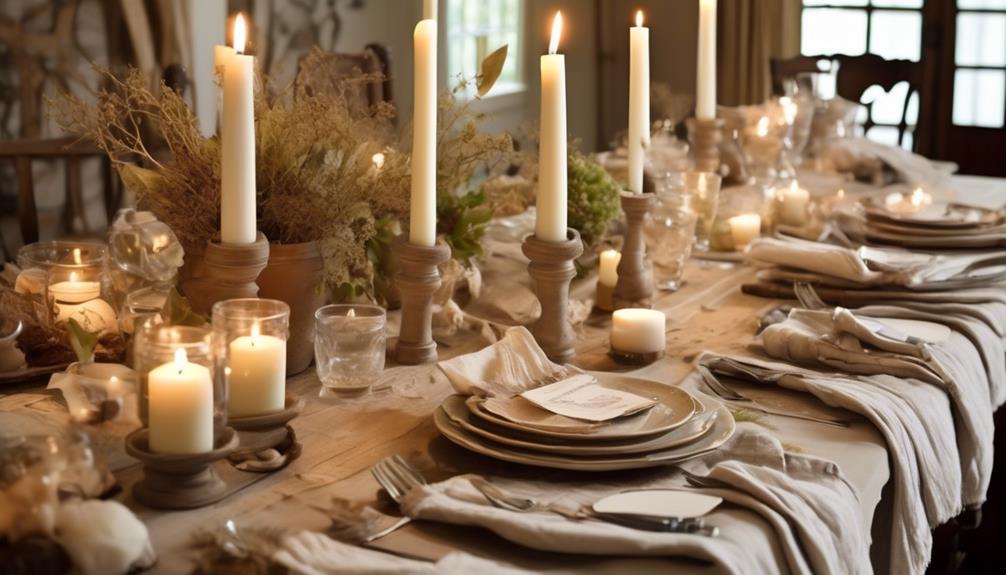
In the realm of budget-friendly dinner table decoration, we frequently traverse a vast array of options. It’s remarkable how, with just a bit of ingenuity and ingenuity, a minimal expenditure can lead to impressive outcomes.
From transforming thrift store treasures into charming centerpieces to discovering budget-friendly tableware options that exude elegance, there are numerous ways to elevate your dining experience without breaking the bank.
So, let's explore some practical and stylish solutions that will leave your guests impressed and your wallet intact.
Key Takeaways
- Utilizing thrift store finds for table decor adds nostalgia and charm while promoting sustainable living.
- DIY centerpieces using repurposed items and budget-friendly materials add a personal touch to the table setting.
- Mixing and matching thrifted or mismatched tableware creates an eclectic and visually appealing atmosphere.
- Affordable linens and decor, such as discounted fabric remnants and dollar store decorations, can transform the table setting without breaking the bank.
Utilize Thrift Store Finds
We've discovered that the key to decorating a dinner table cheaply lies in the art of finding treasures at thrift stores. It's amazing what you can find if you're willing to hunt through the shelves and racks.
Vintage tablecloths are a gem waiting to be discovered. They add a touch of nostalgia and charm to the table setting, and often come at a fraction of the cost compared to brand new ones.
Mismatched china is another treasure trove at thrift stores. Instead of aiming for a perfectly coordinated set, embrace the eclectic charm of mixing different patterns and colors. It adds character and whimsy to the table, and it's a great conversation starter too.
The thrill of finding unique pieces at thrift stores is unmatched. It's like going on a treasure hunt every time we visit. Plus, it's an affordable way to infuse personality and style into our dinner table setup.
Thrift store finds not only save money but also contribute to sustainable living by giving pre-loved items a new home. So, next time you're looking to decorate your dinner table, consider taking a trip to the thrift store – you never know what delightful discoveries await you.
DIY Centerpiece Ideas
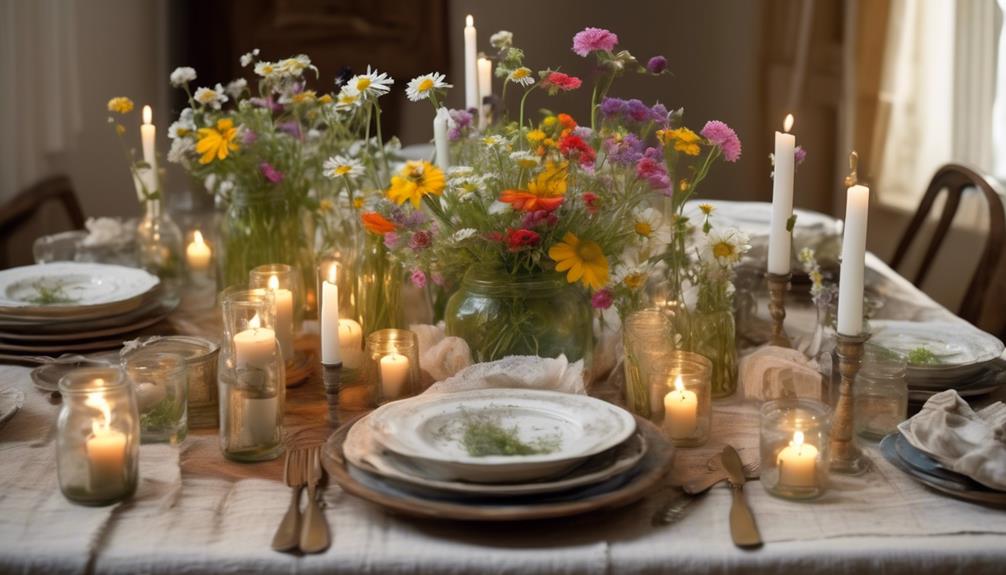
Picking up where we left off with our thrifty treasures, let's now explore some creative and budget-friendly DIY centerpiece ideas to elevate our dinner table decor.
When it comes to floral arrangements, consider gathering wildflowers or greenery from your garden or a local park. Arrange them in mismatched thrifted vases or jars for a charming, rustic look. You can also repurpose old teacups or tin cans as unique containers for smaller floral displays.
For candle holders, transform ordinary items into stunning accents. Use empty wine bottles as chic candle holders by placing taper candles in them. Alternatively, collect old mason jars and fill them with sand or pebbles for a beachy vibe, then add tealights for a warm, inviting glow.
Another idea is to repurpose small terra cotta pots by painting them in your desired color and placing small pillar candles inside for a touch of elegance.
Budget-Friendly Tableware Options
When decorating a dinner table on a budget, consider utilizing thrifted or mismatched tableware for a charming and eclectic look. Not only does this approach add a unique touch to your table setting, but it also saves you money. Dollar stores often have amazing deals on basic tableware such as plates, glasses, and cutlery. It's surprising how a mix of different patterns and colors can create a visually appealing and cozy atmosphere. Another budget-friendly option is upcycling basics. For instance, you can repurpose mason jars as drinking glasses, use old wine bottles as water carafes, or even turn vintage teacups into delightful candle holders. Embracing the mix-and-match concept not only allows for creativity but also promotes sustainable practices by giving new life to old items. To illustrate how this approach can work, take a look at the following table setting:
| Plate | Glass | Cutlery |
|---|---|---|
| Vintage China | Mason Jar | Antique Silver |
| Plain White | Wine Bottle | Gold-toned |
Affordable Linens and Decor
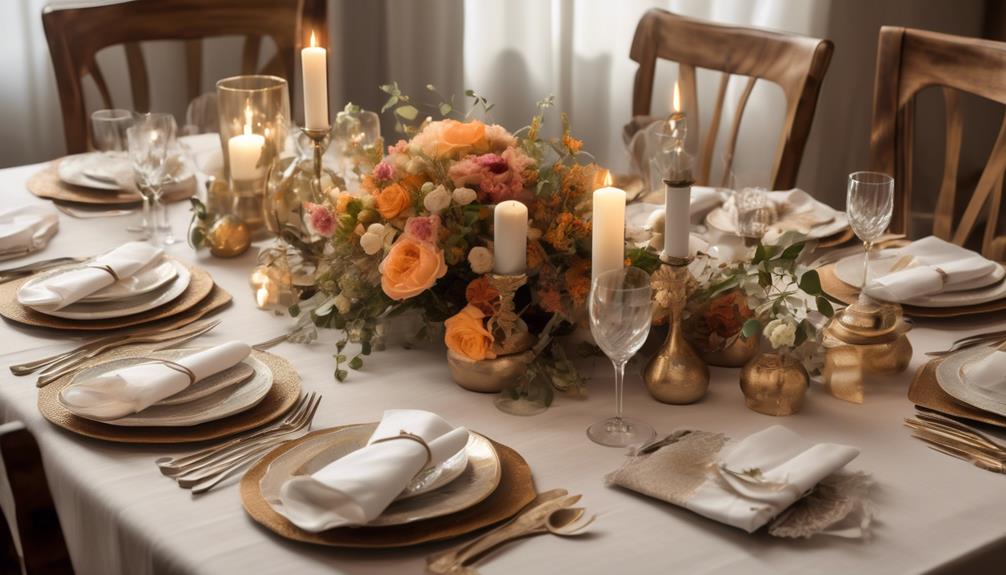
Opting for inexpensive yet charming linens and decor pieces can transform your table setting into a welcoming and stylish space without breaking the bank. When it comes to affordable linens and decor, there are numerous creative options to elevate your dining experience without draining your wallet. Consider these budget-friendly ideas:
- Discounted Fabric: Hit up your local fabric store or check online for discounted fabric remnants. These can be used as tablecloths, table runners, or even makeshift napkins, adding a touch of elegance to your table setting.
- Thrifted Treasures: Browse thrift stores or yard sales for unique and affordable decor pieces such as vintage candle holders, small vases, or quirky trinkets that can be repurposed as charming table accents.
- DIY Centerpieces: Get crafty and create your own centerpieces using inexpensive materials like twine, mason jars, and fresh flowers from your local market. This adds a personalized and budget-friendly touch to your table decor.
- Dollar Store Decorations: Don't underestimate the power of dollar stores. You can find an array of affordable decorations such as tea lights, faux floral arrangements, and decorative ribbons that can enhance your table setting without breaking the bank.
With a little creativity and resourcefulness, you can achieve a beautifully decorated dinner table on a budget.
Repurpose Everyday Items
Our quest for affordable linens and charming decor has led us to the art of repurposing everyday items, unlocking a world of creative possibilities for stylish table settings on a budget.
When it comes to creative napkin holders, think beyond traditional rings. Try using ribbon-wrapped mason jars, adorned with a sprig of greenery, to hold your cloth napkins in place. Alternatively, repurpose old leather belts by cutting them into strips and securing them with decorative buckles for a rustic and unique napkin ring.
For table setting hacks, consider using mismatched teacups and saucers as charming individual salt and pepper holders, or repurpose small wooden crates as elevated platforms for centerpieces.
Embracing the concept of repurposing everyday items not only adds character and creativity to your table, but also provides an opportunity to reduce waste and give new life to forgotten objects.
With a little imagination and resourcefulness, the possibilities for repurposing everyday items into delightful table decor are endless.
Frequently Asked Questions
How Can I Incorporate Sustainable and Eco-Friendly Practices Into My Dinner Table Decor?
Incorporating sustainable and eco-friendly practices into our dinner table decor is important.
We can use eco-friendly tableware made from bamboo or recycled materials.
For sustainable centerpieces, we could opt for potted plants or reusable items like mason jars filled with locally sourced flowers.
These choices not only reduce waste but also add a touch of natural beauty to our table setting.
Are There Any Tips for Creating a Cohesive and Stylish Look When Mixing and Matching Different Thrift Store Finds?
When it comes to mixing and matching thrift store treasures, we've found some great tips for creating a cohesive and stylish look.
Embracing budget-friendly DIY projects can really elevate your decor. We love incorporating personalized centerpieces to add a unique touch.
By embracing the charm of mismatched pieces, you can create a one-of-a-kind table setting that's both stylish and sustainable.
It's all about embracing creativity and making the most of what you find.
What Are Some Creative Ways to Personalize and Customize DIY Centerpieces for Different Occasions or Themes?
When it comes to DIY floral arrangements, we love to get creative with personalized table settings. For a unique touch, consider using items like vintage teacups or mason jars as vases.
Adding personal touches like handwritten place cards or custom napkin rings can really elevate the look.
Don't be afraid to mix and match different textures and colors to create a cohesive and stylish centerpiece for any occasion or theme.
Can You Provide Guidance on How to Choose Durable and High-Quality Budget-Friendly Tableware Options?
When choosing affordable, durable tableware, we prioritize sustainability. We believe in finding pieces that are both budget-friendly and long-lasting, reducing waste and environmental impact.
It's essential to consider the material, versatility, and ease of maintenance. By investing in quality pieces, we ensure they withstand frequent use and diverse occasions, saving money in the long run.
This approach reflects our commitment to practical, resourceful, and eco-conscious table decor.
Are There Any Tips for Repurposing Everyday Items Into Functional and Stylish Dinner Table Decor?
Repurposing items into stylish decor adds a personal touch to the table.
Budget-friendly centerpieces can be created from simple items like mason jars, candles, or even fresh flowers from the garden.
DIY personalization, such as hand-painted place cards or homemade napkin rings, can elevate the overall look.
Can Cheap Decorations Still Create a Romantic Dinner Atmosphere?
When setting a romantic dinner table, cheap decorations can still create a warm and intimate atmosphere. Consider using soft candlelight, fresh flowers, and simple, elegant table linens to set the stage for a memorable evening. The key is to focus on creating a cozy and inviting ambiance for you and your partner to enjoy.
Conclusion
So, there you have it! With a little creativity and resourcefulness, you can decorate a stunning dinner table on a budget.
Did you know that the average cost of decorating a dinner table can be reduced by 50% by using thrift store finds and DIY centerpieces?
By thinking outside the box and repurposing everyday items, you can create a beautiful and inviting dining experience without breaking the bank.
Happy decorating!
- About the Author
- Latest Posts
Introducing Ron, the home decor aficionado at ByRetreat, whose passion for creating beautiful and inviting spaces is at the heart of his work. With his deep knowledge of home decor and his innate sense of style, Ron brings a wealth of expertise and a keen eye for detail to the ByRetreat team.
Ron’s love for home decor goes beyond aesthetics; he understands that our surroundings play a significant role in our overall well-being and productivity. With this in mind, Ron is dedicated to transforming remote workspaces into havens of comfort, functionality, and beauty.
Mardi Gras Decoration
How Does the Tradition of the King's Cake Work?
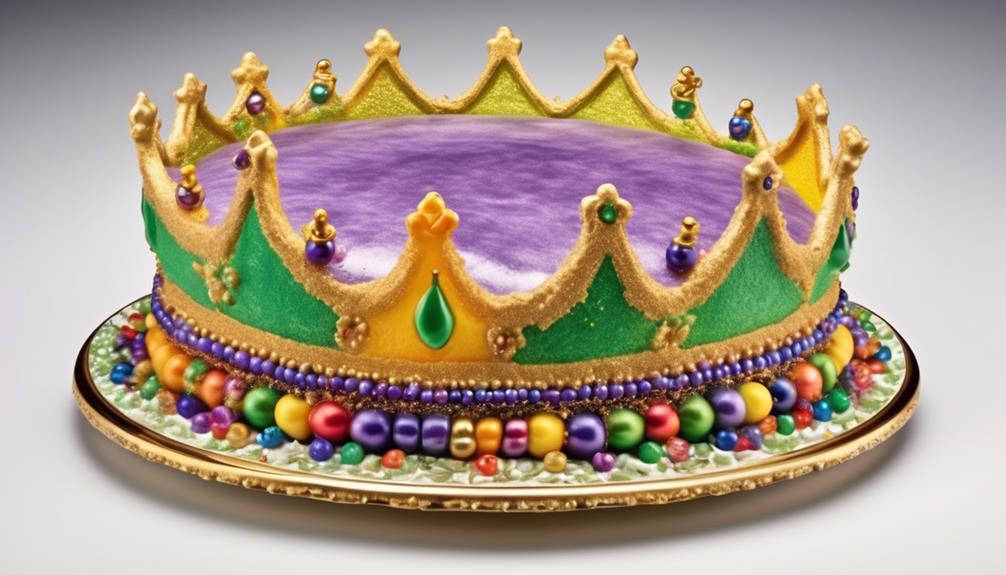
When we delve into the extensive history of the king’s cake, we unveil a beautiful blend of tradition, symbolism, and decadent flavors. This cherished dessert has become intertwined with various cultures, each contributing its own special touch to this long-standing custom.
But how exactly does this cake, crowned with a royal name, work its magic? Let's unravel the layers of this delectable tradition and explore the fascinating customs that have made the king's cake a cherished part of celebrations around the world.
Key Takeaways
- The King's Cake is a tradition that originated in ancient Roman and medieval European cultures and is associated with the Feast of Epiphany.
- The cake symbolizes the pursuit of finding the divine in everyday life and represents the search for spiritual truth and enlightenment within the community.
- The tradition includes a hidden trinket, often representing baby Jesus, which brings luck and prosperity to the person who finds it and makes them the "king" or "queen" of the festivities.
- The King's Cake has evolved over time, with variations in ingredients and flavors, as well as the addition of modern traditions such as online ordering and sharing experiences on social media. It is celebrated globally during the Carnival season and is a central feature of Three Kings' Day and Epiphany celebrations.
Origins of the King's Cake
The origins of the King's Cake can be traced back to ancient Roman and medieval European traditions. With its cultural significance deeply rooted in history, this cake has evolved over time, carrying with it religious symbolism and modern traditions.
In ancient Rome, a cake with a hidden bean or coin was part of the Saturnalia festival, where the person who found the token would be crowned the 'king' of the feast. This tradition continued into medieval Europe, where the cake became associated with the Feast of Epiphany, celebrating the arrival of the Three Kings to visit the infant Jesus.
The cake's round shape and the hidden token symbolized the circular journey of the kings and the search for the Christ child. Today, the King's Cake is enjoyed in various forms across the globe, from the Galette des Rois in France to the Roscón de Reyes in Spain, each with its unique cultural twist.
Its enduring presence in celebrations reflects the enduring nature of traditions and their ability to connect us to our collective past.
Symbolism in the Cake
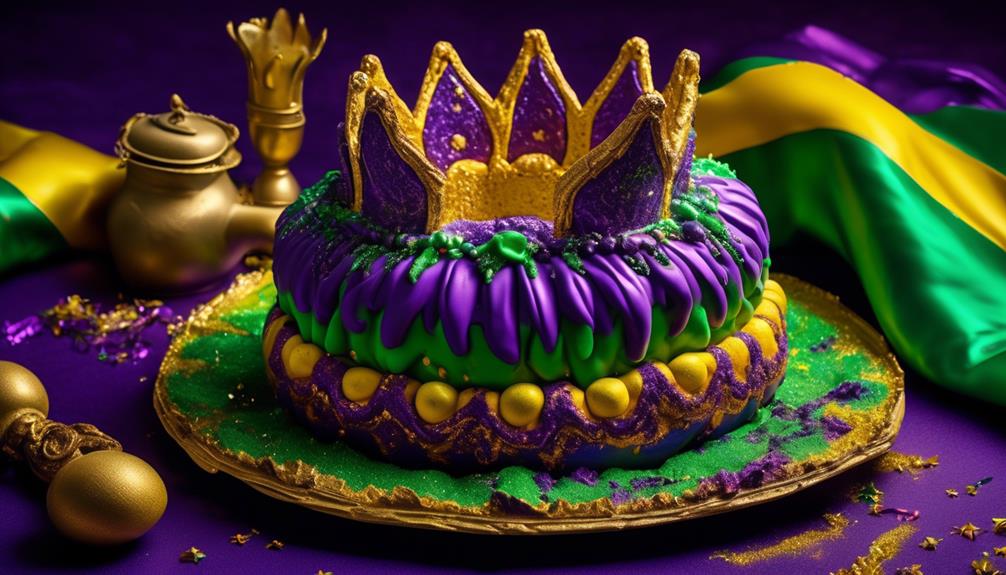
The King's Cake holds deep symbolism, from its religious significance to the tradition of hiding a trinket inside.
As we explore the layers of meaning behind this beloved dessert, we'll uncover the rich traditions and customs associated with the King's Cake.
This symbolic pastry carries with it a sense of community, tradition, and the joy of sharing in festivities.
Religious Symbolism
In the King's Cake, the hidden figurine represents a religious symbol of the pursuit of finding the divine in everyday life. The religious imagery in the King's Cake holds cultural significance, as it symbolizes the search for spiritual truth and enlightenment within the community. This tradition reminds us of the importance of seeking the divine in the ordinary, and the joy that comes with discovering it. The cake serves as a reminder that spirituality is not confined to sacred spaces, but can be found in the simple moments of sharing a meal with loved ones. This symbolism emphasizes the idea that the divine is present in our daily lives, and the King's Cake tradition encourages us to actively seek and celebrate it.
| Religious Symbolism in the King's Cake | |||
|---|---|---|---|
| Represents the pursuit of finding the divine in everyday life | Holds cultural significance | Symbolizes the search for spiritual truth and enlightenment within the community | Reminder of the importance of seeking the divine in the ordinary |
Hidden Trinket Tradition
Embedded within the delectable layers of the King's Cake lies a hidden trinket that adds an element of surprise and tradition to the celebratory dessert.
The tradition of hiding a trinket within the King's Cake has a rich history dating back to ancient Roman times. In those days, a bean or coin was hidden in a cake, and whoever found it was considered blessed for the year.
This practice evolved over time and became associated with the celebration of Epiphany in Christianity. The trinket, often a small figurine or bean, holds cultural significance, symbolizing luck, prosperity, and the discovery of the baby Jesus by the three wise men.
The person who finds the trinket in their slice of cake is traditionally designated as the 'king' or 'queen' of the festivities and may even be tasked with hosting the next gathering.
This delightful custom adds an air of excitement and camaraderie to the joyous occasion.
Traditional Ingredients
Using a secret blend of spices and a rich, buttery dough, traditional King's Cake is meticulously crafted to create a luscious and indulgent treat.
The traditional recipes for King's Cake vary across different cultures, but they commonly include ingredients such as flour, sugar, eggs, butter, milk, and yeast. What sets the King's Cake apart are the special additions like aromatic cinnamon, nutmeg, and sometimes a hint of almond, which infuse the cake with warm, comforting flavors.
The cultural significance of these ingredients is deeply rooted in the history of the cake, with each component symbolizing aspects of the celebration. For example, the richness of the butter and eggs represents the wealth and prosperity associated with the feast, while the spices evoke the exotic flavors of the East, echoing the journey of the Three Kings.
The careful selection and combination of these ingredients not only contribute to the cake's distinctive taste but also honor the traditions and stories that have been passed down through generations. Each bite becomes a delightful homage to the heritage and customs surrounding this beloved confection.
Baking and Decoration
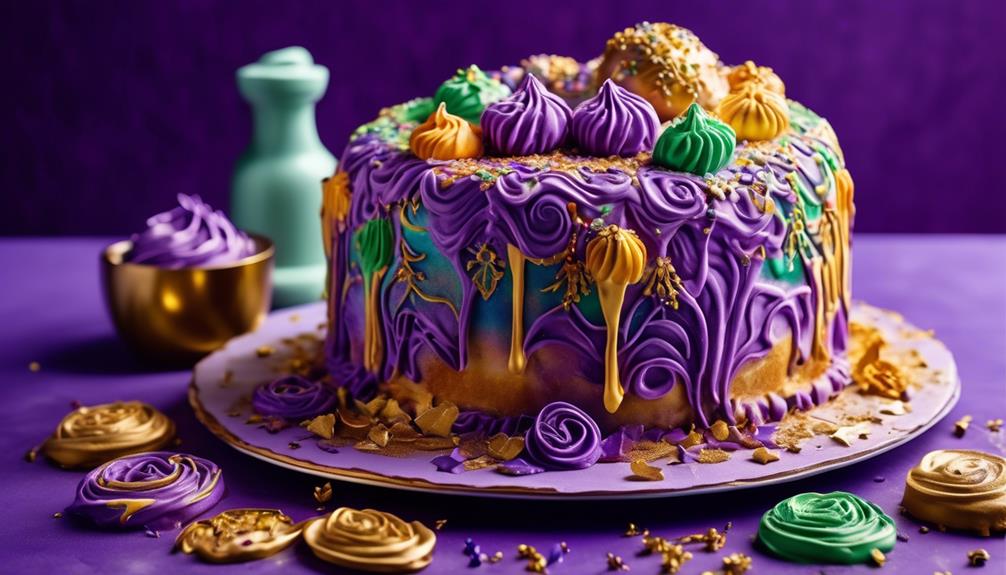
Now, let's talk about the art of baking and decorating the King's Cake.
We'll explore the essential ingredients and tools needed to create this delectable treat, from the rich dough to the vibrant colored sugars and figurines.
Additionally, we'll delve into the traditional designs that adorn the King's Cake, each with its own symbolism and significance.
Cake Ingredients and Tools
In preparing the King's Cake, the baker gathers high-quality ingredients such as flour, sugar, butter, eggs, and yeast, along with essential tools including mixing bowls, measuring cups, a stand mixer, and decorating piping bags.
When it comes to cake decoration, investing in good quality food coloring, edible glitter, and various piping tips can elevate the final presentation.
Baking techniques such as the creaming method for incorporating butter and sugar, and the folding method for gentle mixing of flour into the batter, are crucial for achieving the perfect texture.
Additionally, using parchment paper to line the cake pans and a rotating cake stand for easy frosting application are indispensable.
The right tools and ingredients are the foundation for creating a King's Cake that isn't only delicious but also visually stunning.
Traditional Cake Designs
When designing traditional cakes, bakers incorporate cultural and historical elements to create visually stunning and meaningful confections. Cake decoration reflects a fusion of cultural customs, each design telling a unique story. For instance, intricate henna designs on Indian wedding cakes symbolize joy, beauty, and spiritual awakening. In contrast, the three-tiered fruitcake, adorned with sugared fruit and ribbons, represents prosperity and longevity in British customs. The use of colors, patterns, and symbols in traditional cake designs reflects the values and beliefs of a community. These designs not only celebrate special occasions but also serve as a form of artistic expression, preserving cultural heritage. By incorporating these elements, bakers infuse their creations with a sense of tradition and belonging, making each cake a work of art and a symbol of shared cultural identity.
| Traditional Cake Designs | Cultural Symbolism |
|---|---|
| Henna designs on Indian wedding cakes | Joy, beauty, spiritual awakening |
| Three-tiered fruitcake with sugared fruit | Prosperity, longevity |
| Intricate patterns and symbols | Values and beliefs |
| Use of vibrant colors | Celebration and expression |
| Incorporation of cultural heritage | Tradition and belonging |
Hidden Trinkets and Charms
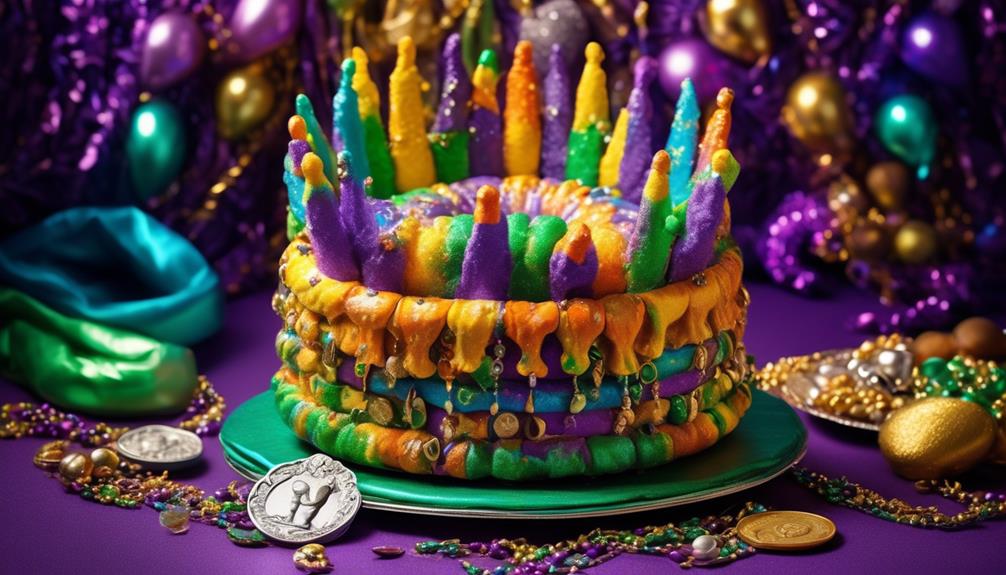
The tradition of the King's Cake involves hiding trinkets and charms within the sweet pastry, adding an element of excitement and surprise to the celebration. This playful custom has deep cultural roots and makes the King's Cake not just a delicious dessert, but also a source of joy and anticipation.
Here's a closer look at this delightful tradition:
- Festive Surprises: As we slice into the King's Cake, the anticipation of finding a hidden trinket or charm creates a sense of excitement and camaraderie among friends and family.
- Symbolic Meanings: The trinkets and charms tucked inside the cake often carry symbolic meanings. From representing good luck and prosperity to symbolizing the finder as the 'king' or 'queen' of the gathering, these tiny treasures add layers of meaning to the occasion.
- Traditional Superstitions: In some cultures, finding the hidden trinket is believed to bring good fortune or even bestow certain responsibilities upon the discoverer, adding an element of cultural superstition to the fun.
- Memorable Moments: The moment when someone discovers a trinket in their slice of cake becomes a cherished memory, creating a lasting bond and adding an extra dash of delight to the festivities.
Historical Celebrations
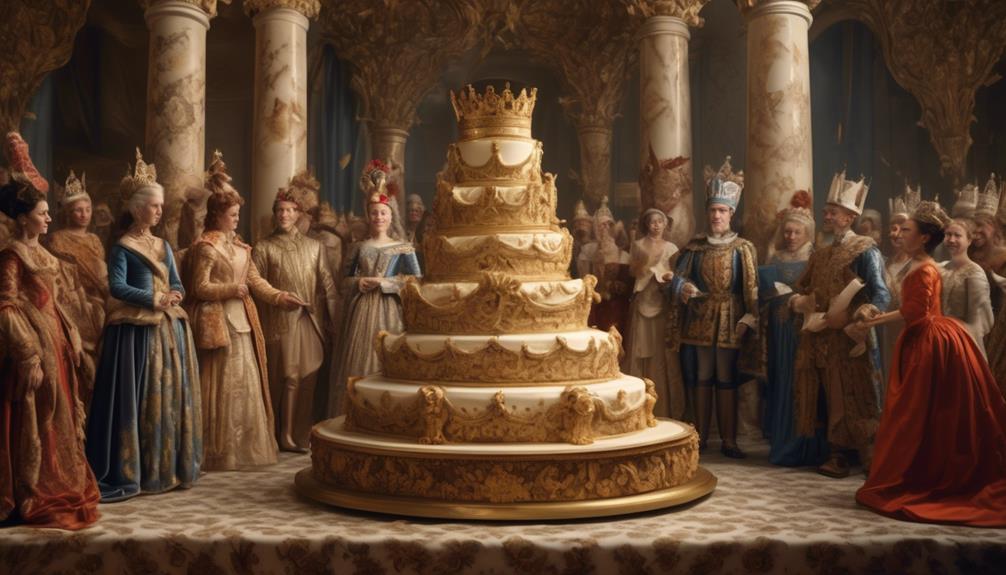
Let's journey back in time to uncover the origins of the King's Cake and its historical significance.
Understanding the cultural celebrations and traditions surrounding this delectable dessert can provide valuable insights into the customs of different societies.
As we explore the historical context, we'll also shed light on how these traditions have evolved and adapted to modern times.
Origins of King's Cake
Amidst the historical celebrations of ancient Rome and medieval Europe, the tradition of the King's Cake first emerged, marking a significant cultural and religious event.
The origins of the King's Cake are rooted in the following:
- Cultural Significance: The King's Cake originated as part of the Roman Saturnalia festival, where a bean was hidden in a cake to determine the 'king of the feast.'
- Religious Symbolism: In medieval Europe, the cake became associated with the Epiphany, representing the arrival of the three wise men and the revelation of Jesus as the son of God.
- Modern Day Customs: Today, the King's Cake is a popular tradition during the Carnival season, with variations in ingredients and decorations across different cultures.
- Global Influence: Over time, the tradition has spread worldwide, adapting to various cultural and religious contexts while maintaining its core symbolism.
Cultural Significance
Emerging from the historical celebrations of ancient Rome and medieval Europe, the cultural significance of the King's Cake is deeply intertwined with the traditions of the Roman Saturnalia festival and the religious symbolism associated with the Epiphany. The cake has become a central element in various cultural traditions, symbolizing the search for the divine and the manifestation of Christ. It is often linked to festive celebrations, where families and friends gather to share this special dessert, reinforcing bonds and creating cherished memories. This communal aspect is reflected in the tradition of hiding a bean or figurine within the cake, adding an element of surprise and excitement to the festivities. The table below illustrates the emotional significance of the King's Cake in these cultural traditions.
| Emotion | Description |
|---|---|
| Togetherness | Gathering of loved ones |
| Excitement | Anticipation of finding the hidden token |
| Tradition | Passing down cultural customs |
Modern Traditions
Modern traditions surrounding the King's Cake have evolved from historical celebrations, adapting to contemporary cultural practices while retaining the cake's symbolic significance. In today's celebratory practices, the King's Cake has taken on new meanings and customs, reflecting cultural variations and modern preferences.
Here are some modern traditions associated with the King's Cake:
- Hidden Trinkets: Instead of the traditional bean or figurine, modern versions of the King's Cake may hide diverse trinkets representing good luck, prosperity, or love.
- Flavor Innovations: Bakers now experiment with various flavors, from classic cinnamon and pecan to innovative combinations like chocolate and raspberry, appealing to different taste preferences.
- Online Ordering: With the convenience of online shopping, people can now easily order King's Cakes from bakeries across the globe, allowing for wider accessibility to this traditional treat.
- Social Media Sharing: Modern celebrants often share their King's Cake experiences on social media, creating a sense of community and shared tradition.
Epiphany and Three Kings' Day
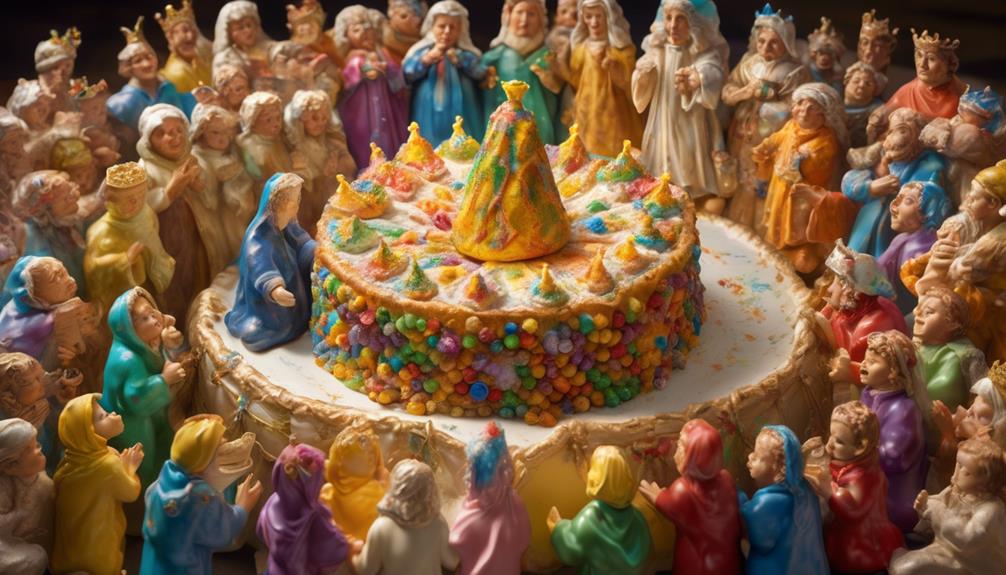
Epiphany and Three Kings' Day mark the culmination of the Christmas season and are celebrated in various cultures around the world. Three Kings' Day, also known as the Feast of the Epiphany, falls on January 6th and commemorates the visit of the Magi to the baby Jesus. In many countries, this day is a public holiday and is celebrated with great fervor. The traditions and customs associated with Epiphany celebrations vary widely, but they often include religious services, parades, and the consumption of special foods like the King's Cake.
In some cultures, it's customary to hold processions reenacting the journey of the Three Wise Men, with participants dressed in elaborate costumes. The day's festivities may also include the blessing of homes and the exchange of gifts. The King's Cake, a sweet pastry often baked in the shape of a crown and adorned with colorful decorations, is a central feature of the celebrations. It's customary to hide a small figurine or trinket within the cake, and whoever finds it's said to have good luck for the coming year. This tradition adds an element of excitement and surprise to the joyous occasion.
Mardi Gras Festivities
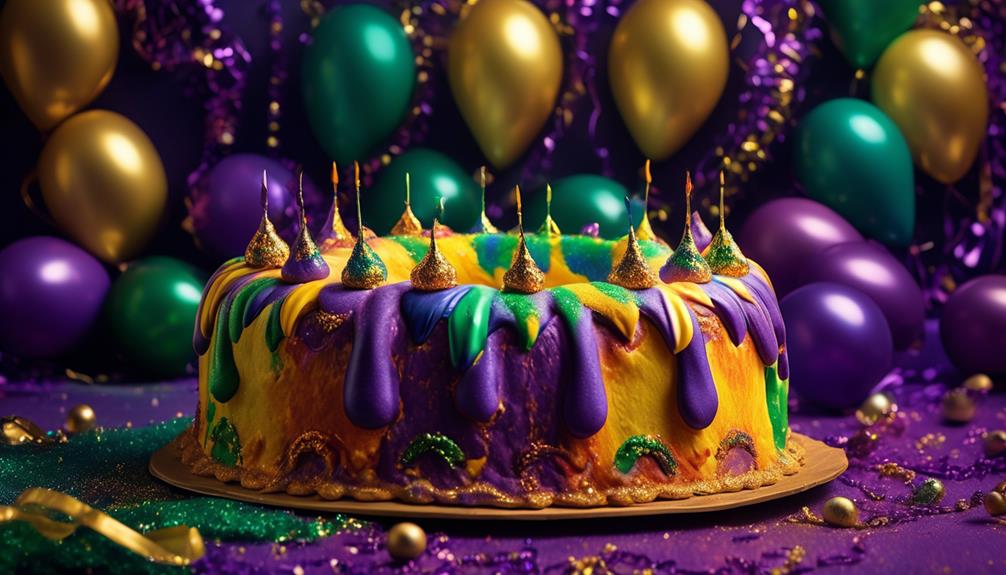
As we shift our focus to Mardi Gras festivities, we can't help but think about the vibrant and lively celebrations that accompany this annual event.
The tradition of the King's Cake takes center stage during these festivities, with its origins deeply rooted in the customs of Epiphany and Three Kings' Day.
One of the most exciting aspects of the King's Cake is the symbolic baby hidden inside, adding an element of surprise and tradition to the Mardi Gras season.
King's Cake Origins
The tradition of the King's Cake, a beloved part of Mardi Gras festivities, has its origins rooted in the rich cultural tapestry of medieval Europe. Our fascination with this delectable treat is deeply intertwined with its historical and cultural significance, as well as the religious symbolism associated with it.
Here's a glimpse into the intriguing origins of the King's Cake:
- Medieval European Roots: The King's Cake originated in medieval France, where it was closely linked to the Feast of Epiphany.
- Religious Significance: The cake symbolizes the biblical story of the three kings visiting the infant Jesus, with the hidden trinket representing the Christ child.
- Cultural Traditions: Over time, the cake became associated with various customs, including the crowning of a king or queen for the day.
- Modern Celebrations: Today, the King's Cake continues to be an integral part of Mardi Gras festivities, with its consumption extending throughout the Carnival season.
Symbolic Baby Inside
Rooted in medieval France, the King's Cake holds a symbolic baby inside, adding an element of surprise and tradition to the vibrant Mardi Gras festivities.
The baby, often made of plastic, represents baby Jesus and symbolizes luck and prosperity. When the cake is sliced and shared among guests, finding the baby in your slice is considered auspicious and brings the responsibility of hosting the next gathering.
This delightful custom has evolved over time, with cultural variations influencing the presentation of the symbolic baby. In some regions, the baby is baked into the cake, while in others, it's placed underneath or inserted after baking.
These cultural differences add to the richness of the tradition and offer a fascinating glimpse into the diverse ways the King's Cake is celebrated across the world.
Mardi Gras Tradition
Mardi Gras festivities burst with vibrant colors, lively music, and exuberant parades, creating a jubilant atmosphere that captivates locals and visitors alike. As we immerse ourselves in the Carnival traditions, a few key elements stand out:
- Floats and Throws: Mardi Gras parades are renowned for their elaborate floats, where krewes throw beads, doubloons, and trinkets to the cheering crowd. It's an exhilarating experience to catch these colorful treasures.
- Masked Revelry: The tradition of wearing masks during Mardi Gras dates back centuries, adding an air of mystery and excitement. Participants often craft intricate and flamboyant masks, contributing to the festival's allure.
- Music and Dance: The rhythmic beats of brass bands and the infectious energy of Mardi Gras music compel everyone to dance along, creating an irresistible urge to join the celebration.
- Indulgent Feasting: The revelry is accompanied by indulgent feasting, with traditional Creole and Cajun cuisines taking center stage, adding a delightful culinary dimension to the festivities.
Global Variations
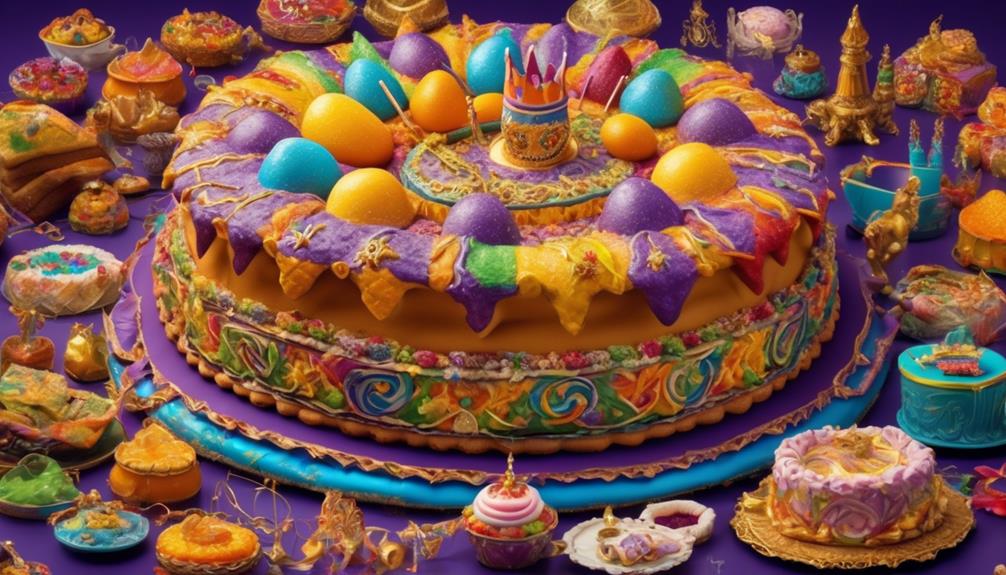
Exploring the global variations of the King's Cake reveals a rich tapestry of cultural influences and unique interpretations.
In France, the Galette des Rois is a puff pastry filled with almond cream, while in Spain and Latin America, the Roscón de Reyes is a sweet, decorated bread-like cake.
Cultural variations are evident in the choice of flavors and fillings, with some regions favoring fruity fillings, while others prefer nut-based or chocolate fillings.
The festive decorations also vary widely, with some cultures favoring colorful sprinkles and icing, and others incorporating symbolic trinkets and figurines within the cake.
In Greece, for example, a coin is often hidden within the cake, and the person who finds it's considered blessed with good luck for the year.
These global variations highlight the significance of the King's Cake as a symbol of unity and celebration across different cultures.
It's fascinating to see how each region has adapted the tradition to reflect its unique customs and culinary preferences, adding depth and richness to the global tapestry of this beloved festive treat.
King Cake Baby Tradition
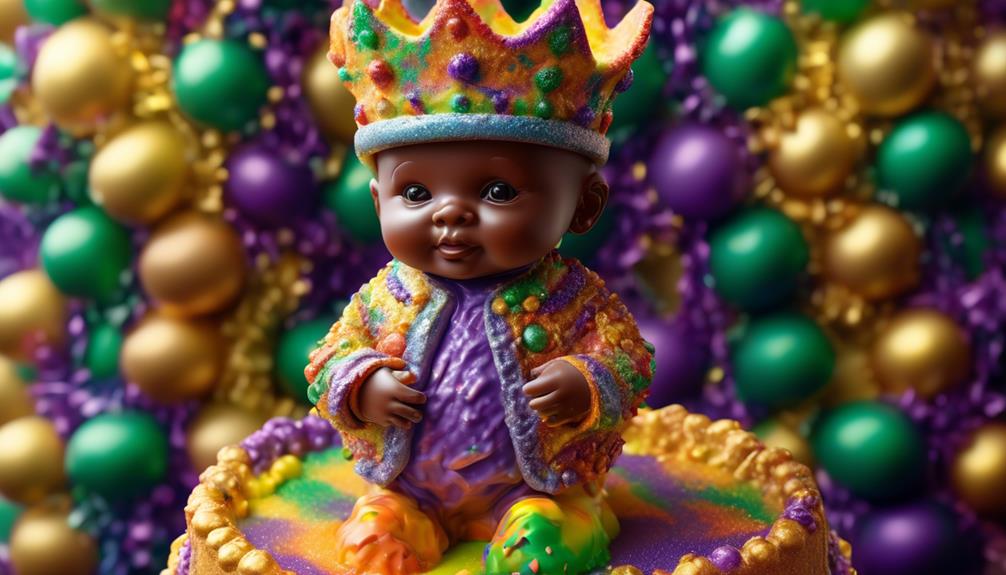
The tradition of the King Cake Baby adds an element of surprise and fun to the King's Cake festivities, as revelers eagerly anticipate who'll find the hidden baby figurine and be bestowed with good luck and the responsibility of hosting the next celebration.
- Cultural Significance: The King Cake baby holds deep cultural significance, symbolizing luck and prosperity. Finding the baby in your slice not only brings good fortune but also carries the responsibility of hosting the next King's Cake celebration, keeping the tradition alive.
- Symbol of Unity: The King Cake baby is more than just a trinket; it symbolizes unity and community. The person who discovers the baby becomes the focal point of the celebration, fostering a sense of togetherness and camaraderie among participants.
- Secrecy and Excitement: The anticipation of finding the baby creates an air of secrecy and excitement during the cake-cutting ceremony. It adds an extra layer of enjoyment to the event as everyone waits with bated breath to see who'll uncover the hidden treasure.
- Generational Bond: Passing down the tradition of the King Cake baby from one generation to the next strengthens familial and cultural bonds, creating a shared experience that transcends time. It's a way of preserving heritage and celebrating the ties that bind us.
Royal Court and King's Cake
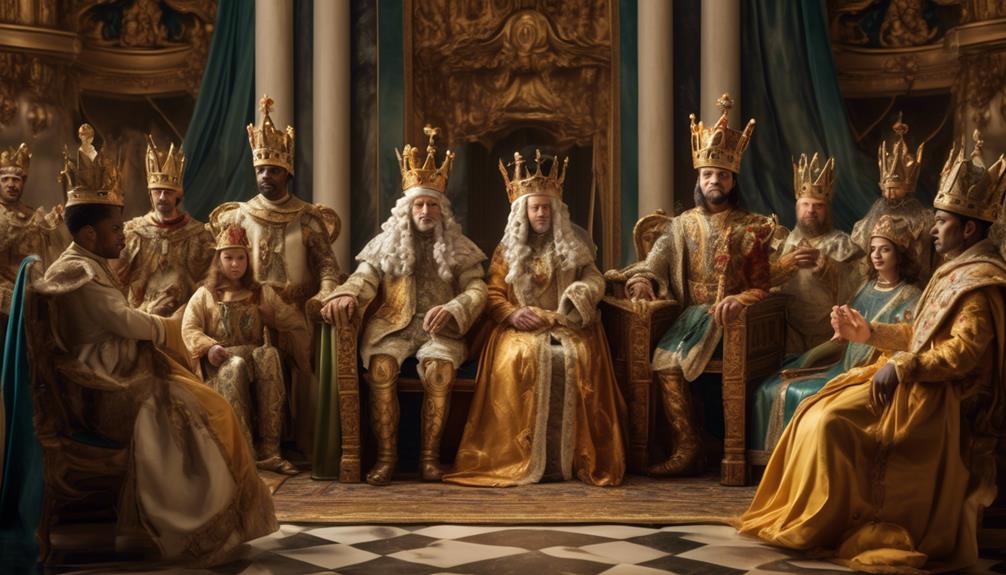
As we delve into the tradition of the Royal Court and its connection to the King's Cake, we uncover the rich history and symbolism woven into this time-honored custom.
Royal court celebrations were often marked with elaborate feasts and the serving of festive desserts, with the King's Cake being a centerpiece of these indulgent gatherings. The cake itself, often rich in flavor and adorned with regal colors, was a symbol of opulence and abundance, fit for honoring the monarch and the esteemed members of the royal court.
During royal court celebrations, the King's Cake took on a special significance. Its circular shape represented the unending cycle of the seasons and the eternal nature of the monarchy, while the hidden trinket or bean within the cake added an element of surprise and anticipation to the festivities. The person who found the trinket was bestowed with the honor of being the 'king' or 'queen' for the day, adding an element of lighthearted fun to the solemnity of the royal court.
The King's Cake thus became a focal point of royal gatherings, symbolizing not only wealth and luxury but also the spirit of camaraderie and revelry within the esteemed circles of the monarchy.
Modern-Day Customs
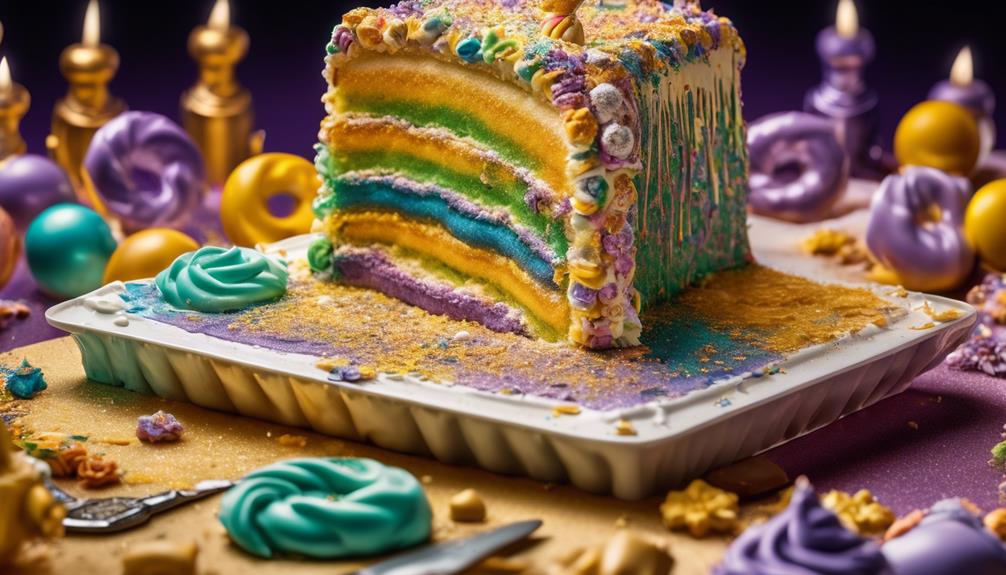
After uncovering the historical significance of the King's Cake in royal court celebrations, we can now explore how modern-day customs have adapted and evolved this tradition into contemporary society. Cultural evolution and changing social dynamics have influenced the way the King's Cake is celebrated today. Here are some contemporary practices:
- Diverse Flavors: Today, King's Cakes come in a variety of flavors such as chocolate, cream cheese, and fruit-filled, catering to modern taste preferences while still preserving the symbolic trinket hidden within.
- Social Gatherings: The tradition of sharing King's Cake has evolved into social gatherings where friends and family come together to enjoy the cake, fostering a sense of community and togetherness.
- Online Ordering: With the advent of technology, people can now order King's Cakes online, making it more accessible to a wider audience, regardless of geographical location.
- Inclusive Trinkets: To reflect contemporary values of inclusivity, some modern King's Cakes feature diverse trinkets that represent various cultural symbols, encouraging unity and diversity within the tradition.
These modern-day customs reflect the adaptability and timelessness of the King's Cake tradition, ensuring its relevance in today's society.
King's Cake in Popular Culture
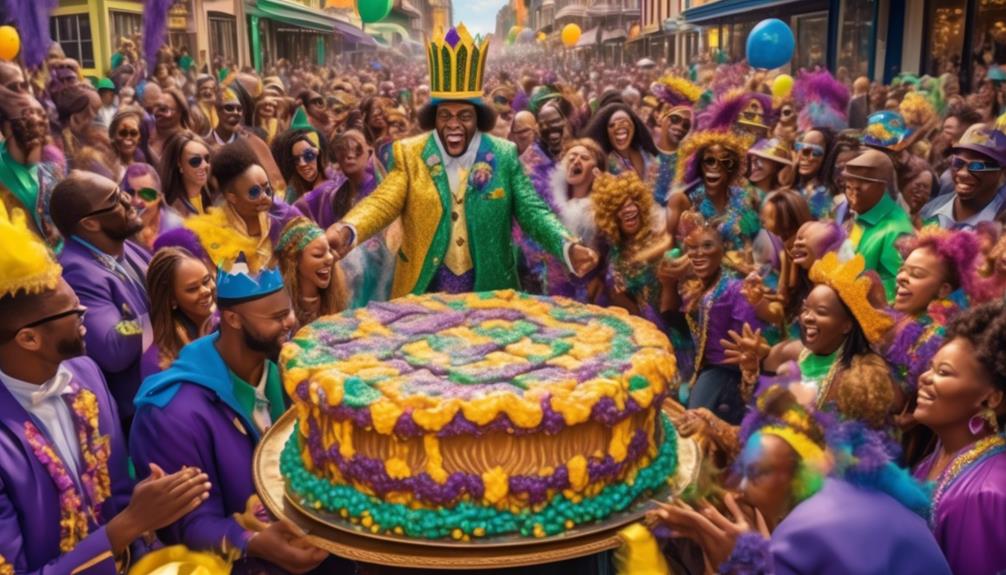
In popular culture, King's Cake has become a symbol of celebration and community, with its presence extending beyond traditional festivities into various forms of media and social gatherings. The rich history of King's Cake has permeated popular culture, appearing in movies, TV shows, and literature as a representation of joyous occasions and shared traditions.
The tradition of hiding a tiny baby figurine inside the cake has also been featured in popular culture, adding an element of surprise and playful competition to the narrative.
The King's Cake has made its mark in popular culture, serving as a focal point in Mardi Gras celebrations, where the cake's vibrant colors and festive decorations are showcased in parades and parties. Additionally, its presence in social media has further solidified its role in modern popular culture, with enthusiasts sharing their King's Cake creations and experiences online, fostering a sense of community and camaraderie.
From its historical significance to the beloved King's cake baby tradition, the cake has become a beloved symbol of togetherness and merriment, making it a cherished icon in popular culture.
King's Cake Recipes and Tips
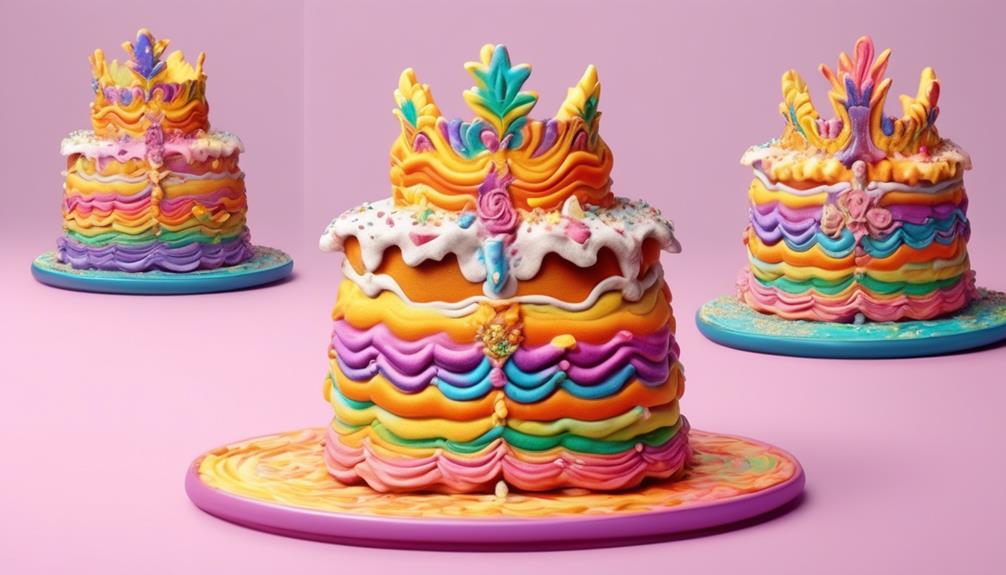
King's Cake in popular culture has sparked a growing interest in creating and sharing delightful King's Cake recipes and tips for enthusiasts to enjoy. Here are some tips and ideas for making the perfect King's Cake:
- Flavorful Variations: Experiment with different king's cake flavors such as traditional cinnamon, creamy praline, or even a decadent chocolate filling. Get creative with the flavors to cater to diverse preferences and surprise your guests with a unique twist on this classic treat.
- Creative Decorations: Elevate the visual appeal of your King's Cake by adding creative decorations. Consider using colorful icing, edible gold or silver dust, or even incorporating the colors of Mardi Gras – purple, green, and gold. These decorative elements not only enhance the cake's appearance but also add an extra layer of excitement to the overall experience.
- Homemade Dough: For an authentic touch, consider making the King's Cake dough from scratch. The homemade dough adds a level of richness and freshness that store-bought dough simply can't match.
- Sharing the Tradition: Don't forget the most crucial ingredient – sharing! Whether it's with family, friends, or colleagues, the joy of the King's Cake tradition lies in coming together and celebrating. So, bake a little extra to share the tradition with others and spread the joy of this time-honored treat.
Frequently Asked Questions
What Are the Potential Health Risks Associated With Consuming a King's Cake, Especially for Individuals With Dietary Restrictions or Allergies?
Potential health risks associated with consuming a king's cake, especially for individuals with dietary restrictions or allergies, include allergic reactions to ingredients like nuts or dairy. It's crucial to check the cake's ingredients carefully before consumption.
For those with dietary restrictions, the high sugar and fat content in the cake may pose challenges. It's important to be mindful of consumption restrictions and seek alternative options to enjoy the tradition without compromising health.
Are There Any Superstitions or Beliefs Surrounding the Consumption of a King's Cake, and What Are the Associated Rituals or Customs?
Superstitions and beliefs intertwine with the consumption rituals and customs of the King's Cake, adding an enchanting layer to the tradition. Our interactions with this delicacy can be steeped in cultural variations and serve as a symbol of unity and celebration.
Additionally, serving etiquette and special occasions adaptations further enrich the experience. It's truly fascinating how this pastry carries such deep significance and meaning across different communities.
How Does the Tradition of the King's Cake Vary Among Different Socioeconomic Classes or Cultural Groups?
Socioeconomic differences and cultural variations shape the tradition of the king's cake. Among various groups, the way the cake is made, its ingredients, and the significance of finding the hidden trinket can vary.
In some communities, elaborate king's cake parties are thrown, while in others, it's a more intimate family affair. The cake's design and size may also reflect these differences.
These distinct traditions add richness and diversity to the celebration of the king's cake.
Are There Any Specific Guidelines or Etiquette for Serving and Sharing a King's Cake at Social Gatherings or Events?
Serving etiquette and sharing guidelines for a King's cake are important in maintaining the tradition's spirit. It's customary to hide a small figurine or bean inside the cake and whoever finds it gets crowned 'king' or 'queen' for the day.
When serving, the host should explain the tradition and warn guests about the hidden token. Then, the cake is cut with each person receiving a slice until the hidden piece is found.
Can the King's Cake Be Adapted for Special Occasions or Holidays Outside of the Traditional Epiphany and Mardi Gras Celebrations?
Absolutely! Adapting traditions is a beautiful way of celebrating diversity.
Whether it's a birthday, a wedding, or a cultural festival, the King's Cake can be infused with new meanings and flavors, honoring different traditions and bringing people together in delightful ways.
It's a heartwarming tribute to the richness of our shared experiences.
Embracing the King's Cake in diverse contexts is a reflection of our collective desire to celebrate unity in all its beautiful forms.
Conclusion
In conclusion, the tradition of the king's cake is a rich and fascinating part of cultural celebrations. From its ancient origins to its modern-day customs, the cake holds a special place in the hearts of many.
Its symbolism, hidden trinkets, and royal court traditions make it a truly unique and cherished dessert.
So, next time you indulge in a slice of king's cake, remember that you're participating in a time-honored tradition that's fit for royalty!
- About the Author
- Latest Posts
Introducing Ron, the home decor aficionado at ByRetreat, whose passion for creating beautiful and inviting spaces is at the heart of his work. With his deep knowledge of home decor and his innate sense of style, Ron brings a wealth of expertise and a keen eye for detail to the ByRetreat team.
Ron’s love for home decor goes beyond aesthetics; he understands that our surroundings play a significant role in our overall well-being and productivity. With this in mind, Ron is dedicated to transforming remote workspaces into havens of comfort, functionality, and beauty.
Decor
How to Diy Letter Decor
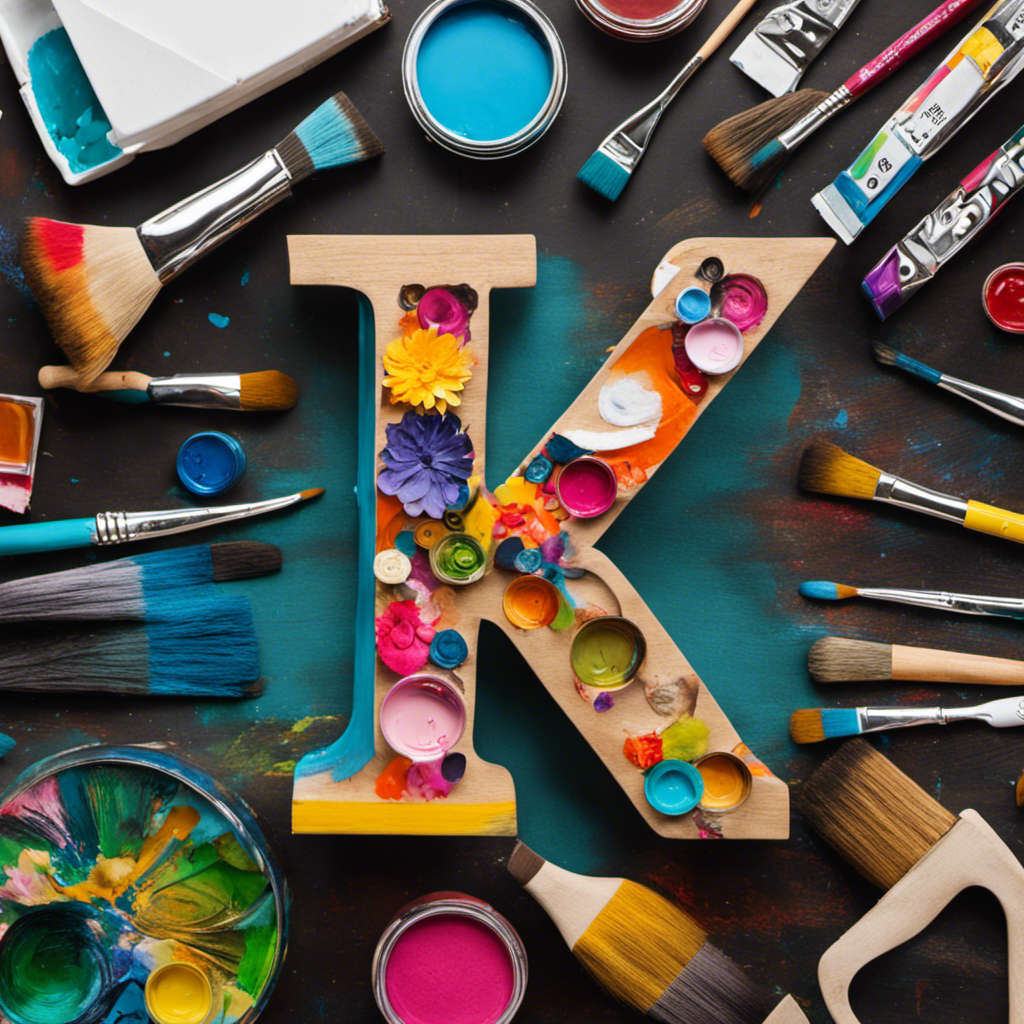
As someone who loves crafting, I’ve found a special talent in creating DIY letter decor. It’s amazing how a plain letter can become a beautiful addition to personalized home decor.
But don’t be fooled by its humble appearance, my friend. With a few materials and a touch of creativity, you’ll unveil a world where letters become masterpieces.
So, grab your paintbrush and let’s embark on this delightful journey of turning ordinary letters into extraordinary works of art.
Key Takeaways
- Choose the right letters and materials that complement your desired aesthetic and fit proportionally in the space.
- Use essential tools such as a utility knife, hot glue gun, paintbrushes, and ruler for a successful DIY project.
- Prep the materials by cleaning, sanding, priming, and applying sealant for a professional-looking finish.
- Design your letter decor by considering color schemes, letter placement, personalized design inspiration, and experimenting with different sizes and arrangements.
Choosing the Right Letters
When choosing the right letters for your DIY letter decor, it’s important to consider their size and style.
Letter sizing plays a crucial role in creating a visually appealing display. You want your letters to be large enough to be noticed, but not too overwhelming that they overshadow other elements. Consider the space where you plan to place your decor and choose letters that fit proportionally.
Additionally, letter finishes can greatly impact the overall look of your project. Whether you prefer a glossy, matte, or metallic finish, it’s important to select letters that complement your desired aesthetic. The finish can add texture and depth to your decor, enhancing its visual appeal.
Preparing Your Materials
When it comes to preparing materials for a DIY project, there are three key points to consider: the essential tools needed, choosing the right materials, and prepping those materials for use.
Having the right tools is crucial for a successful project, so make sure to have a variety of tools such as a hammer, screwdriver, and measuring tape.
Next, selecting the right materials is important for achieving the desired outcome, whether it’s wood, fabric, or metal.
Lastly, prepping the materials involves cleaning, sanding, or priming them to ensure a smooth and professional finish.
Essential Tools Needed
You’ll need a few essential tools to DIY letter decor. Having the right tools will make the process easier and ensure a successful project execution. Here are the tools I recommend having on hand:
-
Utility knife: This will come in handy for cutting out the letters from your chosen material, whether it’s paper, wood, or foam.
-
Hot glue gun: An essential tool for securing your decorations onto the letters. It provides a strong bond and dries quickly.
-
Paintbrushes: Depending on your design, you may need various sizes of paintbrushes to apply paint or other decorative elements.
-
Ruler: A ruler will help you measure and mark the placement of your decorations, ensuring a neat and precise result.
With these tools at your disposal, you’ll be well-equipped to tackle your DIY letter decor project with confidence and precision.
Choosing the Right Materials
To create beautiful and unique decorations, it’s important to carefully select the right materials for your project. When it comes to DIY letter decor, there are many trendy options to choose from. Not only do these materials add a personalized touch to your space, but they are also budget-friendly. Here are some popular choices for DIY letter decor:
| Material | Description |
|---|---|
| Wood | Wood letters are versatile and can be painted, stained, or decorated with various embellishments. They add a rustic and natural look to your decor. |
| Cardboard | Cardboard letters are lightweight and easy to work with. They can be covered with fabric, paper, or even painted to match your desired theme. |
| Cork | Cork letters are perfect for creating a unique and textured look. They can be left plain or painted to add a pop of color to your decor. |
| Foam | Foam letters are lightweight and affordable. They can be easily decorated with paint, fabric, or even glitter to create a fun and whimsical look. |
Prepping Materials for Use
Once you’ve selected the right materials, it’s important to properly prepare them for use. Prepping techniques and surface preparation are crucial to achieving a professional-looking DIY letter decor. Here are some key steps to follow:
-
Clean the surface: Use a mild soap and water solution to remove any dirt, dust, or grease from the surface of your materials.
-
Sanding: Depending on the material, sanding can help smooth rough edges and create a better surface for painting or adhesion.
-
Priming: Applying a primer will ensure better paint adhesion and improve the overall finish of your project.
-
Sealant: For outdoor or high-moisture areas, applying a sealant can help protect your letter decor from the elements.
Designing Your Letter Decor
When it comes to designing your letter decor, there are a few key points to consider.
First, think about the color scheme options that will best suit the space where you plan to display your letter. From bold and vibrant to subtle and neutral, the possibilities are endless.
Next, explore letter placement ideas to create a visually appealing arrangement. Whether you choose to stack them, hang them, or scatter them, let your creativity guide you.
Lastly, seek personalized design inspiration to add a unique touch to your letter decor. Browse through magazines, websites, or even take a walk in nature to find ideas that resonate with your personal style.
Color Scheme Options
There are various color scheme options you can choose from for your DIY letter decor. When it comes to letter decoration techniques, the right color combination can make all the difference.
Here are some color scheme ideas to inspire your creativity:
-
Monochromatic: Stick to shades of a single color for a clean and minimalist look.
-
Complementary: Combine colors that are opposite each other on the color wheel for a bold and vibrant effect.
-
Analogous: Choose colors that are adjacent to each other on the color wheel for a harmonious and soothing vibe.
-
Neutral with a pop: Use neutral colors as a base and add a pop of bright color for a modern and eye-catching design.
Experiment with different color schemes to find the one that best suits your style and the space you’re decorating. Let your imagination run wild and have fun creating your personalized letter decor!
Letter Placement Ideas
To create an eye-catching display, try experimenting with different letter placement ideas that suit your style and space.
One key aspect to consider is the size of the letters. Depending on the size of your space and the message you want to convey, you can play around with different letter sizes.
Larger letters can make a bold statement and grab attention, while smaller letters can create a more delicate and intricate design.
Another fun aspect to explore is creative arrangements. Instead of simply lining up the letters in a straight line, you can try arranging them in a curve or a spiral.
You can also experiment with overlapping the letters or creating unique shapes with them.
The possibilities are endless when it comes to letter placement, so let your creativity run wild!
Personalized Design Inspiration
Get inspired to create a unique and personalized design for your space. When it comes to letter decor, the possibilities are endless. You can truly make it your own by incorporating personalized letter styles and creative letter arrangements.
Need some inspiration? Here are a few ideas to get you started:
- Mix and match different letter sizes and fonts for an eclectic look.
- Use unconventional materials like reclaimed wood or metal for a rustic touch.
- Create a gallery wall with a collection of different letters spelling out meaningful words or phrases.
- Experiment with different colors and patterns to add a pop of personality to your space.
With these ideas in mind, you’re ready to take on the next step: applying paint or fabric. So let’s dive in and bring your letter decor to life!
Applying Paint or Fabric
I’ll show you how to easily apply paint or fabric to your letter decor.
When it comes to applying paint techniques, there are a few key steps to follow. First, make sure your letter surface is clean and smooth. Sand it if necessary and wipe away any dust.
Next, choose your desired paint color and apply a base coat. Allow it to dry completely before moving on to the fun part – adding texture and design. You can use sponges, brushes, or even stencils to create unique patterns and effects.
Now, let’s talk fabric. Using different fabric types can add depth and interest to your letter decor. Consider using patterned fabrics for a bold statement or textured fabrics for a more subtle touch. Simply cut the fabric to fit your letter shape and secure it with glue or a staple gun.
Experiment with different techniques and materials to create a truly personalized piece of letter decor.
Adding Embellishments
After applying paint or fabric to my letter decor, I love adding embellishments to really make it stand out. There are so many creative ways to enhance the look of the letters and make them unique.
Here are some of my favorite embellishment techniques:
- Glitter: Adding a touch of sparkle with glitter can instantly transform plain letters into eye-catching decor.
- Ribbons and bows: Tying colorful ribbons or attaching bows to the letters adds a charming and whimsical touch.
- Beads and sequins: Sewing or gluing beads and sequins onto the letters can create a glamorous and luxurious look.
- Paper flowers: Making and attaching paper flowers to the letters adds a lovely and feminine touch.
With these embellishment techniques, the possibilities for creative letter designs are endless.
Now that my letter decor is perfectly adorned, it’s time to move on to the exciting task of hanging or displaying them in my space.
Hanging or Displaying Your Letter Decor
Once you’ve completed your embellishments, consider how you can creatively hang or display your unique letter designs in your space. There are numerous hanging techniques and creative display options that can showcase your letter decor in a stylish and eye-catching way. Here are some ideas to inspire you:
| Hanging Technique | Description | Benefits |
|---|---|---|
| String and Clothespins | Attach your letters to a string with clothespins and hang them on a wall or across a window. | Easy to change and rearrange. |
| Floating Shelves | Install floating shelves on your wall and arrange your letters on them for a modern and minimalist look. | Provides a clean and organized display. |
| Letter Collage | Create a collage using multiple letters and frame it for a unique and personalized wall art. | Adds depth and visual interest to your space. |
Experiment with different hanging techniques and display options to find the one that best suits your style and space. Get creative and have fun showcasing your letter decor!
Tips and Tricks for a Professional Finish
To achieve a professional finish, try using a small brush to apply a thin and even coat of paint. This will help you achieve a smooth surface that looks polished and well-done.
Additionally, using stencils effectively can add a unique and professional touch to your letter decor. Here are a few tips and tricks to help you achieve that professional finish:
- Use a high-quality stencil: This will ensure that the design comes out crisp and clear.
- Secure the stencil: Use painter’s tape or adhesive spray to keep the stencil in place while painting.
- Apply the paint evenly: Use a dabbing or stippling motion with your brush to prevent smudging or bleeding.
- Remove the stencil carefully: Peel it off slowly and gently to avoid smudging the design.
Frequently Asked Questions
How Do I Choose the Right Font for My Letter Decor?
When choosing the right font for letter decor, there are several factors to consider. Firstly, think about the overall theme and style you want to achieve. Matching the font style to the theme will create a cohesive and visually appealing look.
What Types of Materials Should I Avoid Using for Letter Decor?
When it comes to letter decor, it’s important to avoid using materials like flimsy paper or cheap adhesive. Instead, opt for sturdy materials like wood or metal for a more durable and professional look.
Can I Use Stencils to Help With the Designing Process?
Yes, you can definitely use stencils to assist with the designing process of letter decor. Stencils offer a variety of design options and make it easier to achieve precise and professional-looking results. They are a great tool for creating unique and stylish letter decor designs.
Are There Any Specific Techniques for Applying Paint or Fabric to Letters?
When it comes to applying paint or fabric to letters, there are various techniques to consider. From brush strokes to stenciling and even decoupage, each method offers a unique way to personalize your DIY letter decor.
What Are Some Creative Ways to Hang or Display My Letter Decor?
To display letter decor, get creative! Instead of traditional wall mounting, try unique alternatives like hanging from a ceiling or arranging on a floating shelf. Incorporate letter decor into different room styles by pairing with complementary colors and textures.
Conclusion
In conclusion, creating personalized letter decor is a fun and rewarding DIY project that allows you to showcase your creativity. By carefully choosing the right letters and materials, designing a unique layout, and adding your personal touch through paint or fabric, you can transform plain letters into stunning decorative pieces.
Don’t forget to add embellishments to make your decor truly stand out. Whether you hang it on a wall or display it on a shelf, your letter decor will surely add a touch of charm to any space.
So go ahead, let your imagination soar and create something truly extraordinary! Remember, as Maya Angelou once said, "You can’t use up creativity. The more you use, the more you have."
- About the Author
- Latest Posts
Introducing Charles, the Editor in Chief at ByRetreat, whose passion for interior design and editorial excellence elevates every remote workspace to new heights. With his keen eye for detail, impeccable taste, and expertise in design, Charles brings a wealth of knowledge and creativity to the ByRetreat team.
As the Editor in Chief of a renowned lifestyle blog, Charles has honed his skills in curating captivating content and staying up-to-date with the latest trends in interior design. His deep understanding of aesthetics and the power of storytelling through design enables him to create remote workspaces that are not only visually stunning but also rich in personality and meaning.
Mardi Gras Decoration
Why Do People Not Put Tinsel on Trees Anymore?
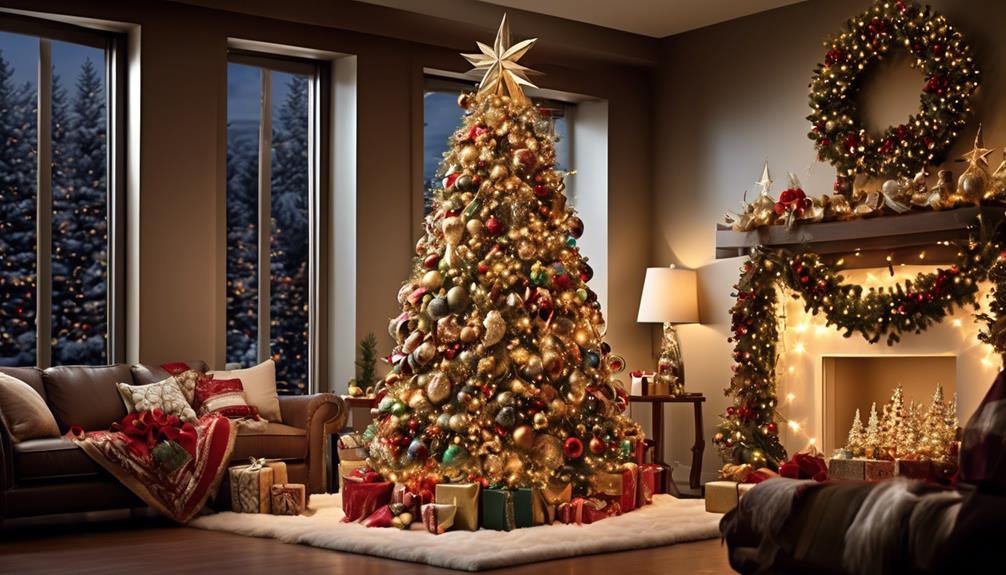
Those were the days when holiday trees sparkled with tinsel, creating a magical atmosphere in the room. It feels like a far-off memory now, doesn’t it?
The decline of tinsel on Christmas trees has been a topic of conversation in recent years, and there are several factors contributing to this shift in tradition. From environmental concerns to changing aesthetic preferences, there are numerous reasons why tinsel has lost its place in holiday decor.
Join us as we explore the complexities behind this tinsel-free trend and uncover the various forces at play.
Key Takeaways
- Tinsel is no longer popular due to its environmental impact and non-recyclability.
- Safety concerns, such as choking hazards and ingestion risks, have led to the use of safer alternatives.
- The minimalist and streamlined aesthetic preferences have shifted away from tinsel towards more elegant and understated decorations.
- Eco-friendly options and sustainable materials are being favored, promoting a more sustainable mindset in holiday decor choices.
Tinsel's Historical Significance
Tinsel's historical significance can be traced back to ancient civilizations, where it was used to symbolize wealth and prosperity in religious rituals and celebrations.
In many cultures, tinsel was considered a symbol of good fortune and was used to adorn traditional decorations during special ceremonies and festivities. Its shimmering appearance reflected the light and was associated with the divine and spiritual realms, adding an aura of enchantment to the surroundings.
The use of tinsel as a decorative element was a testament to the value placed on opulence and beauty in these ancient societies. As time progressed, tinsel became intertwined with the traditions of various cultures, evolving into a symbol of abundance and joy during seasonal celebrations.
Its historical significance is deeply rooted in the human desire to elevate the ordinary into something extraordinary, infusing everyday objects with symbolic meaning. Understanding the historical importance of tinsel sheds light on its enduring appeal and its role in shaping the traditions and customs that we hold dear today.
Environmental Concerns

The production and disposal of tinsel has raised environmental concerns due to its non-biodegradable nature and potential contribution to plastic pollution. As we become more conscious of our environmental impact, the use of traditional tinsel has decreased. Its metallic coating makes it non-recyclable, and when it ends up in landfills, it can take hundreds of years to decompose. The environmental impact of tinsel extends beyond its disposal, as its production also contributes to resource depletion and pollution.
In response to these concerns, many individuals and businesses have sought out eco-friendly alternatives or have opted for minimalist decorations that have a lower environmental impact. Additionally, some innovative companies have introduced recyclable or biodegradable tinsel options, providing a more sustainable choice for those who still want to enjoy the sparkle of tinsel without compromising their environmental values.
Furthermore, for those who still have traditional tinsel, exploring recycling options can help mitigate its environmental impact. Some recycling centers accept tinsel, but it's crucial to check local guidelines and ensure that it can be properly recycled.
Ultimately, our collective efforts to address the environmental concerns associated with tinsel can lead to more sustainable holiday traditions for future generations.
Safety Risks
Many families have experienced incidents involving tinsel and small children during the holiday season. The shiny, colorful strands can be enticing to young kids, but they also pose safety risks. Tinsel can easily be ingested by curious toddlers, leading to potential choking hazards.
As parents, we understand the concern for safety regulations when it comes to decorating our homes for the holidays. In the past, we've had our own heart-stopping moments, which made us rethink the use of tinsel in our holiday decor.
Thankfully, product innovation has offered us safer alternatives that still bring that festive sparkle into our homes. Manufacturers have developed tinsel-like decorations made from non-toxic materials and designed to be larger in size, reducing the risk of ingestion. These advancements align with the safety regulations in place, providing peace of mind for parents while maintaining the joy of holiday decorating.
As a result, many families have shifted towards these modern alternatives, prioritizing the safety of their little ones without sacrificing the holiday spirit.
Changing Aesthetic Preferences
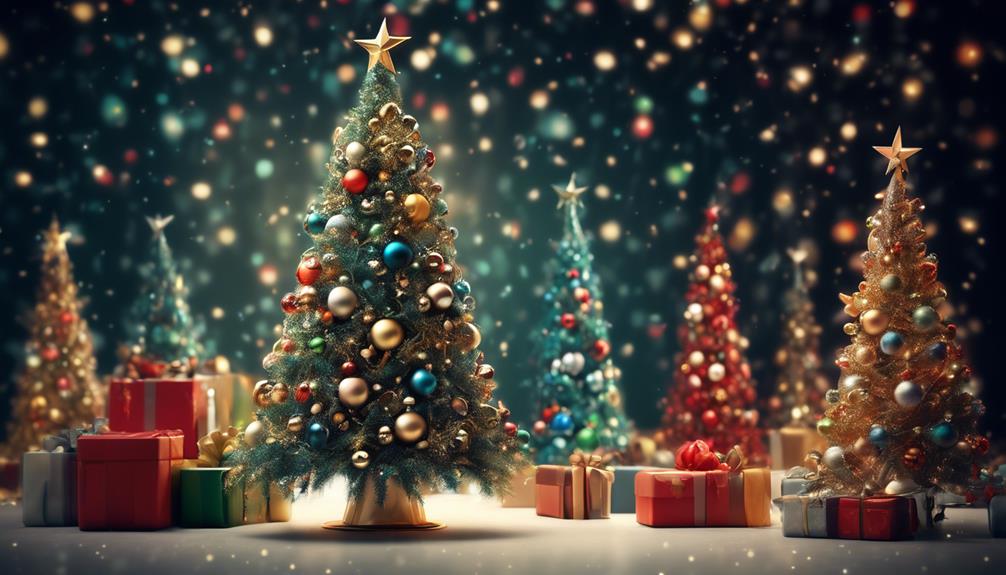
Despite the safety concerns surrounding traditional tinsel, our family has also noticed a shift in our aesthetic preferences when it comes to holiday decorations. We've observed that many people, including ourselves, are gravitating towards a more minimalistic approach to decorating our homes during the holiday season. This shift in preference is influenced by various factors, including color psychology and the growing influence of the minimalist movement.
| Factors Influencing Aesthetic Preferences | Description | Impact on Decorations |
|---|---|---|
| Color Psychology | The psychological effects of colors play a significant role in our holiday decor choices. For example, calming and neutral tones are gaining popularity over traditional vibrant and flashy colors. | Our decorations now feature more subdued and calming color schemes, creating a serene and peaceful holiday ambiance. |
| Minimalist Movement | The minimalist movement emphasizes simplicity and functionality, leading to a preference for clean lines and uncluttered spaces. | Our holiday decorations have become more streamlined, with a focus on simple and elegant designs that complement our overall home decor. |
This shift towards a more minimalist and color psychology-informed approach reflects a desire for a sense of tranquility and sophistication in our holiday decor, aligning with our evolving aesthetic preferences.
Alternative Decorative Options
We've all experienced the struggle of finding the right decorations for our holiday trees. Tinsel safety concerns have led many of us to seek out alternative options that are both stylish and safe.
Let's explore modern ornament trends and eco-friendly decor choices that can give our trees that festive touch without the worry.
Tinsel Safety Concerns
As we seek safer alternatives to tinsel for decorating our Christmas trees, it's important to consider options that add sparkle and charm without posing a risk to pets and young children. Tinsel allergy and fire hazard are significant concerns, prompting us to explore alternative decorative options that are both safe and visually appealing.
Here are some alternative decorative options to consider:
- Garland: A safer alternative that brings a classic and elegant touch to the tree.
- Ornaments: Colorful and diverse, they can be placed strategically to add sparkle and charm.
- Ribbons: Versatile and safe, they can be used to create a festive look without the risks associated with tinsel.
- LED lights: Energy-efficient, cool to the touch, and available in various colors and styles.
- Fabric ornaments: Soft and safe for children and pets, they can add a cozy, homemade feel to the tree.
Modern Ornament Trends
In recent years, modern ornament trends have shifted towards a more diverse and eco-friendly selection, reflecting a growing emphasis on sustainability and creativity in holiday decor. We've noticed a resurgence of retro revival ornaments, bringing back the classic charm of vintage decorations. These ornaments often feature nostalgic designs and colors, appealing to those seeking a touch of nostalgia in their holiday displays. Additionally, there's a growing interest in a minimalist approach to ornamentation, with many opting for sleek and simple designs that embody understated elegance. This trend aligns with the contemporary preference for clean, uncluttered aesthetics while also promoting a more sustainable mindset by encouraging the use of fewer materials. Here's a glimpse of the evolving modern ornament trends:
| Retro Revival | Minimalist Approach | Eco-friendly Options |
|---|---|---|
| Vintage designs | Sleek and simple | Sustainable materials |
Eco-Friendly Decor Choices
Eco-conscious consumers are increasingly seeking alternative decorative options that prioritize sustainability and environmental impact. When considering eco-friendly decor choices, it's essential to focus on sustainable materials and adopt a minimalist approach. Here are some alternative options to consider:
- Natural Ornaments: Utilize ornaments made from sustainable materials such as wood, bamboo, or recycled glass.
- LED Lights: Opt for energy-efficient LED lights to reduce electricity consumption.
- Upcycled Decor: Embrace DIY projects using upcycled materials to create unique and eco-friendly decorations.
- Living Decor: Incorporate potted plants or living wreaths for a fresh and sustainable touch to your decor.
- Fabric Decor: Use fabric-based decorations like cloth ribbons and handmade fabric ornaments to reduce plastic waste.
Maintenance Challenges
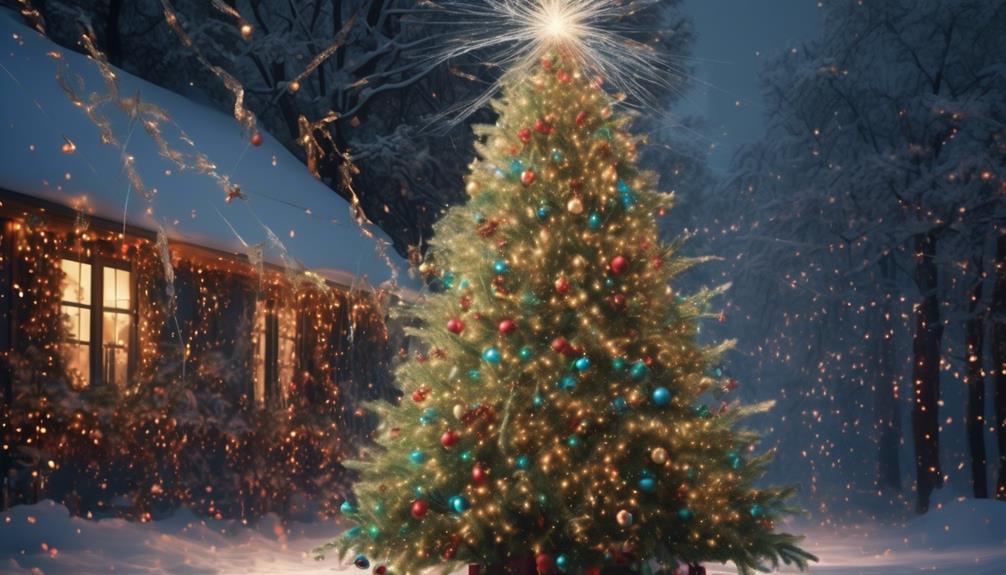
After years of struggling with untangling and disposing of tinsel, many of us have opted to skip this traditional decoration for our Christmas trees. The maintenance challenges associated with tinsel have led to a shift in decorating trends. Tinsel can be a nightmare to maintain, constantly getting tangled and creating a mess that requires frequent untangling. Not to mention the painstaking process of picking up those tiny pieces that seem to find their way into every nook and cranny. These challenges have prompted us to seek alternatives that are easier to maintain, such as garlands, ribbons, or even handmade ornaments.
The trend towards simpler and more manageable decorations reflects the desire to enjoy the holiday season without the added stress of maintenance. Many of us long for a hassle-free decorating experience, and tinsel just doesn't fit into that vision. As we embrace these alternatives, we find that our trees still look stunning without the added maintenance headaches.
It's all about finding a balance between tradition and practicality, and in this case, maintenance-friendly alternatives win out.
Allergen Considerations
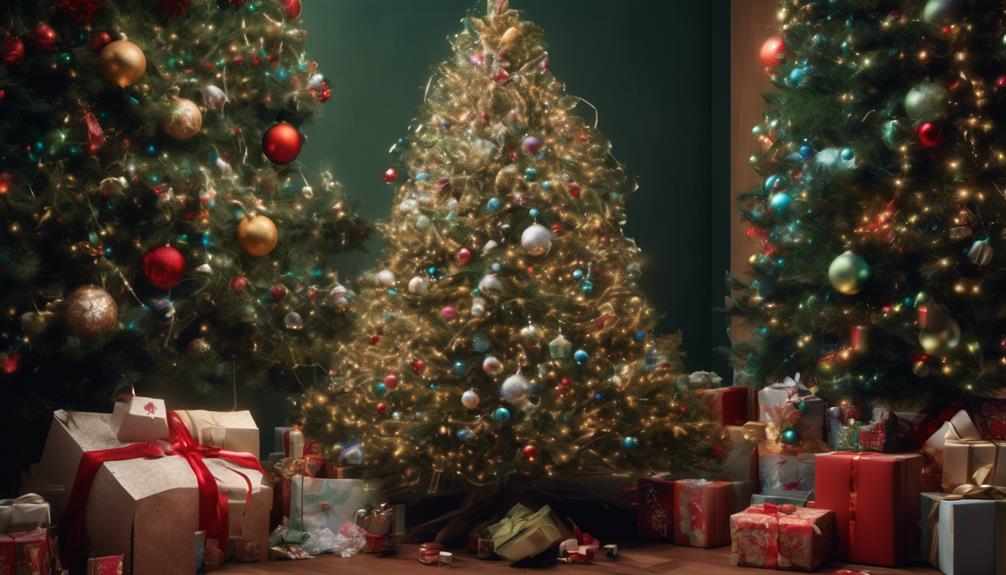
Considering potential allergens is essential when choosing tree decorations. We want our homes to be a safe and welcoming space for everyone, especially during the festive season. Here are some factors to consider for allergy-friendly decorations:
- Material Choices: Opt for hypoallergenic materials such as glass, metal, or plastic for ornaments, as these are less likely to trigger allergies compared to organic materials like dried fruits or pinecones.
- Avoiding Fragrance: Some decorations come with added scents or fragrances that can be problematic for individuals with sensitivities. Look for unscented options to ensure a allergy-friendly environment.
- Allergy Friendly Alternatives: Consider using alternatives to traditional decorations, such as fabric ribbons instead of tinsel, or artificial greenery instead of real plants, to reduce the risk of allergens.
- Dust and Mold: Keep in mind that stored decorations can accumulate dust and mold, which can exacerbate allergies. Regularly clean and dust decorations before displaying them.
- Consulting with Allergist: If someone in the household has severe allergies, it may be beneficial to consult with an allergist for specific recommendations on allergy-friendly decorations.
Pet and Child Safety
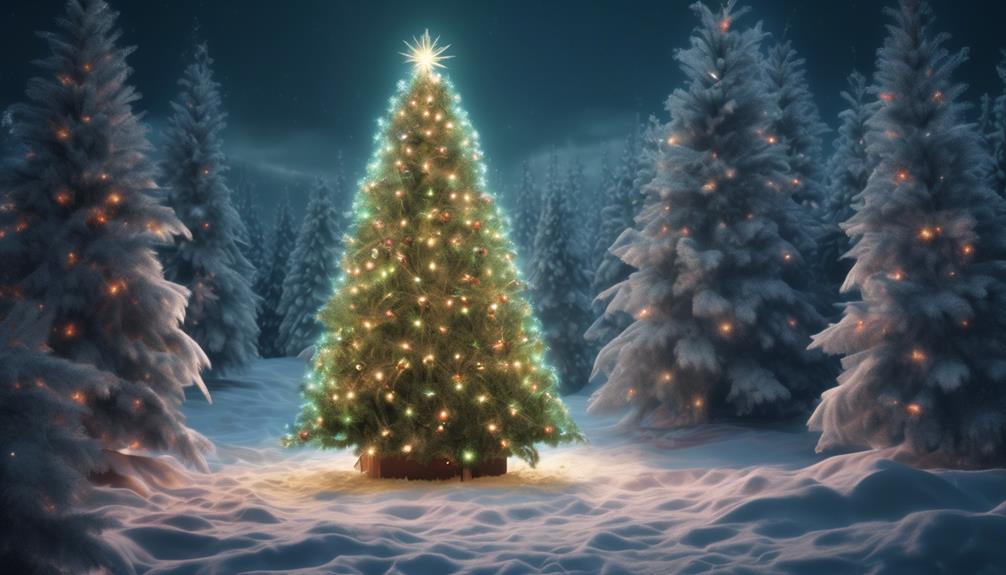
We prioritize the safety of our pets and children when selecting decorations for our holiday tree. Holiday traditions are important, but so is ensuring that our furry friends and little ones are safe.
Tinsel, while once a popular choice for adding sparkle to the tree, can pose a significant risk to pets, especially cats. The shiny, dangling strands can be all too tempting for curious pets, but if ingested, tinsel can cause serious harm. It can lead to intestinal blockages, which may require surgery to remove. As a result, many of us have opted for safer alternatives such as garlands made of fabric or paper.
When it comes to child safety, we also consider the materials and ornaments we use. Fragile glass ornaments or small decorations that could be choking hazards are avoided, and we opt for sturdier, child-friendly options.
Cultural and Regional Influences
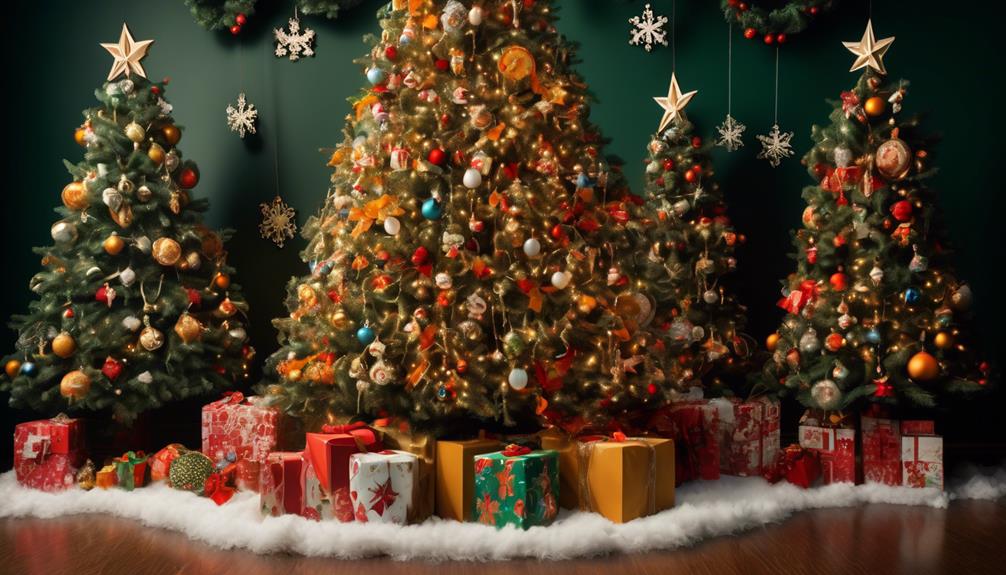
When thinking about holiday decorations, our cultural and regional influences play a significant role in shaping our choices. Our traditions and backgrounds impact the way we decorate for the holidays, leading to diverse and evolving practices.
- Regional Traditions: Different regions have unique customs and rituals that influence holiday decor. For example, in some areas, the use of natural elements like pinecones and evergreen branches is more prevalent, while in others, bright and colorful ornaments take center stage.
- Cultural Influence: Our cultural heritage greatly impacts the way we approach holiday decorations. Families with diverse backgrounds often blend traditions, resulting in a fusion of styles and ornaments that reflect their multicultural identity.
- Local Celebrations: Specific local celebrations and events can also shape holiday decor choices. For instance, communities with winter festivals may incorporate specific themes into their decorations, such as snowflakes and icicles.
- Historical Significance: Historical events and legacies can influence the way holidays are celebrated and decorated in different regions. This may manifest in traditional ornaments or color schemes that hold historical significance.
- Migration and Diaspora: Migration patterns and diasporic communities bring together diverse traditions, creating unique and blended approaches to holiday decorations. These influences can be seen in the ornaments, colors, and symbols used to adorn homes during the holidays.
Tinsel Manufacturing Changes

The evolution of tinsel manufacturing techniques has significantly impacted its popularity in holiday decorations. With a growing emphasis on sustainability, the shift towards eco-friendly materials and production techniques has reshaped the tinsel industry. Manufacturers are now utilizing sustainable materials such as recycled plastics, biodegradable films, and even natural elements like wood and metal to create tinsel. These sustainable materials not only reduce the environmental impact but also resonate with consumers who are increasingly mindful of their ecological footprint.
In addition to materials, production techniques have also undergone significant changes. Advanced manufacturing processes now allow for more efficient use of resources, minimizing waste and energy consumption. Innovations such as 3D printing have enabled intricate designs and patterns, offering a modern twist to traditional tinsel while reducing material waste. Furthermore, the adoption of water-based dyes and coatings has replaced harmful chemicals, making tinsel safer for both consumers and the environment.
As consumers become more conscientious about their purchasing decisions, the shift towards sustainable materials and production techniques in tinsel manufacturing reflects a broader movement towards eco-conscious holiday traditions.
Future of Tinsel on Christmas Trees
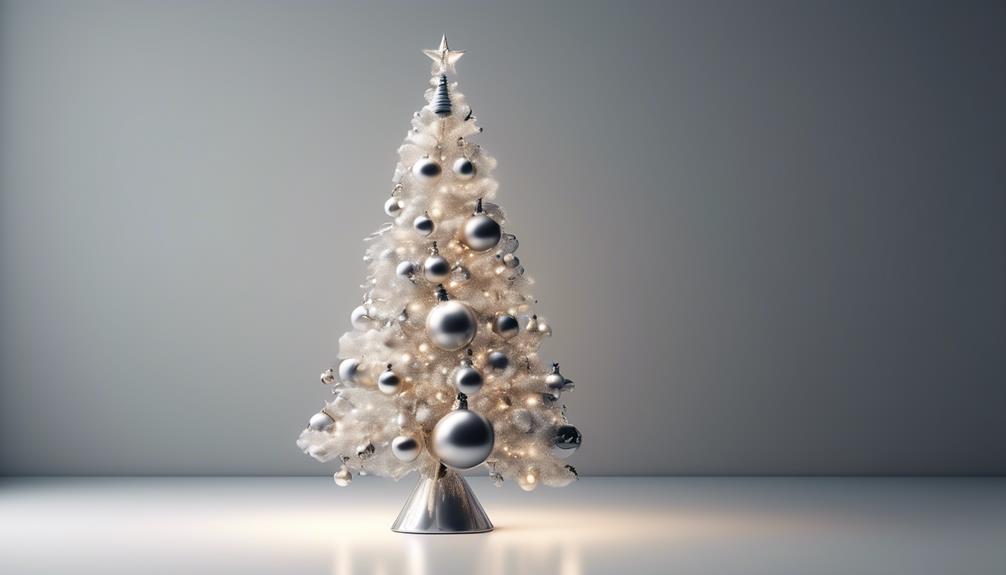
With the increasing focus on sustainability in tinsel manufacturing, the future of tinsel on Christmas trees looks poised to embrace eco-friendly materials and innovative production techniques. As consumers become more conscious of the environmental impact of their choices, the tinsel industry is adapting to meet these evolving demands. Here's what we can expect for the future of tinsel on Christmas trees:
- Tinsel revival: Manufacturers are revamping traditional tinsel designs and creating modern, stylish options to reignite interest in this classic holiday decoration.
- Eco-friendly materials: The future of tinsel will see a shift towards using biodegradable and recyclable materials, aligning with the growing preference for sustainable products.
- Innovative production techniques: Advancements in manufacturing processes will lead to tinsel that isn't only environmentally friendly but also of higher quality and durability.
- Consumer behavior: The future of tinsel on Christmas trees will be shaped by consumer preferences, driving manufacturers to cater to changing tastes and values.
- Customization and personalization: Expect tinsel offerings that allow for personalization, reflecting the trend towards unique, tailored holiday decor.
As we move forward, the tinsel industry is set to evolve in response to both environmental concerns and shifting consumer behaviors, paving the way for a tinsel revival that aligns with modern values and aspirations.
Frequently Asked Questions
How Do I Properly Store Tinsel After the Holiday Season?
When it comes to organizing after the holidays, storing tinsel properly is key. We've found that keeping tinsel in a sealed container or resealable bag helps maintain its shine for the next holiday season.
It's important to avoid tangling to make decorating easier next time. Also, keeping tinsel away from excessive heat or sunlight preserves its quality.
Proper tinsel storage ensures your holiday decorations stay beautiful year after year.
Are There Any Specific Cultural or Regional Traditions That Still Incorporate Tinsel on Christmas Trees?
In some cultures and regions, tinsel still plays a significant role in Christmas tree decorations. Cultural traditions and regional variations have kept the practice alive, with certain communities embracing tinsel as a cherished part of their holiday celebrations.
It's fascinating how diverse customs can be, and it adds a unique touch to the festive season. It's heartwarming to see how these traditions bring people together in joyous celebration.
Are There Any Alternative Uses for Tinsel Aside From Decorating Christmas Trees?
We've found that tinsel, once a staple for decorating Christmas trees, has lost its luster in recent years.
But when it comes to alternative uses, tinsel can find new life through reuse, crafting, and recycling. Its shimmering strands can be repurposed for various artistry projects, adding a touch of sparkle to DIY decorations or enhancing the beauty of handmade crafts.
It's an opportunity to breathe new life into this festive material.
What Are the Potential Long-Term Environmental Effects of Tinsel Usage?
Environmental impact of tinsel usage can be significant. The tiny shreds of plastic aren't biodegradable and can end up in oceans, harming marine life. Recycling options for tinsel are limited, exacerbating the problem.
As a result, we need to consider alternative decorations that are more sustainable. Our long-term choices can protect the environment and ensure a healthier planet for future generations.
How Has the Manufacturing Process of Tinsel Changed Over Time?
We've seen a significant shift in the Evolution of Tinsel and Modern Tinsel Production processes.
Manufacturers now prioritize eco-friendly materials and sustainable production methods, reducing environmental impact.
This has led to the development of tinsel that's safer for both people and the planet.
The changes in manufacturing have made modern tinsel not only visually appealing but also more environmentally conscious.
Conclusion
In conclusion, tinsel's time on Christmas trees has tapered off due to environmental and safety concerns, as well as changing aesthetic preferences.
While some still savor its shimmer, others opt for alternative decorations that are more pet and child-friendly.
Tinsel's future on trees may dim, but its historical significance and cultural influences will continue to sparkle in our memories.
- About the Author
- Latest Posts
Introducing Ron, the home decor aficionado at ByRetreat, whose passion for creating beautiful and inviting spaces is at the heart of his work. With his deep knowledge of home decor and his innate sense of style, Ron brings a wealth of expertise and a keen eye for detail to the ByRetreat team.
Ron’s love for home decor goes beyond aesthetics; he understands that our surroundings play a significant role in our overall well-being and productivity. With this in mind, Ron is dedicated to transforming remote workspaces into havens of comfort, functionality, and beauty.
-
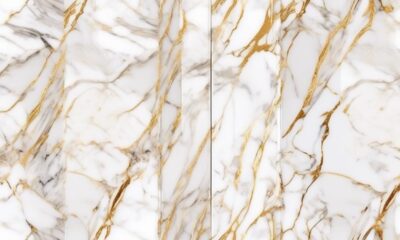
 Vetted4 weeks ago
Vetted4 weeks ago15 Best Contact Paper for Kitchen Cabinets to Elevate Your Home Decor
-

 Vetted2 weeks ago
Vetted2 weeks ago15 Best Poe Cameras for Home Security – Reviews & Buying Guide
-

 Vetted4 weeks ago
Vetted4 weeks ago15 Best Drain Snakes to Unclog Your Pipes Like a Pro
-

 Beginners Guides1 week ago
Beginners Guides1 week agoI Inhaled Vinegar Fumes
-

 Vetted4 weeks ago
Vetted4 weeks ago14 Best Stationery Brands for Your Next Writing Adventure
-

 Beginners Guides3 weeks ago
Beginners Guides3 weeks agoSwinger Porch Light Color
-
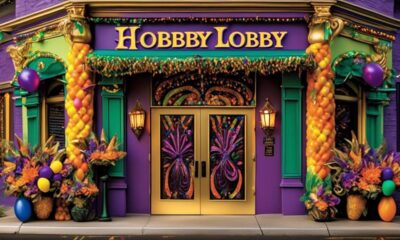
 Mardi Gras Decoration4 weeks ago
Mardi Gras Decoration4 weeks agoWhy Does Hobby Lobby Not Do Mardi Gras?
-

 Vetted2 weeks ago
Vetted2 weeks ago15 Best Blinds for Bathroom Windows to Enhance Privacy and Style








![Best 42 Inch Ceiling Fans Under $100: Affordable and Effective Solutions [2024] 176 61FOGKbhRiL](https://byretreat.com/wp-content/uploads/2023/11/61FOGKbhRiL-80x80.jpg)








![Best 42 Inch Ceiling Fans Under $100: Affordable and Effective Solutions [2024] 191 61FOGKbhRiL](https://byretreat.com/wp-content/uploads/2023/11/61FOGKbhRiL-560x600.jpg)
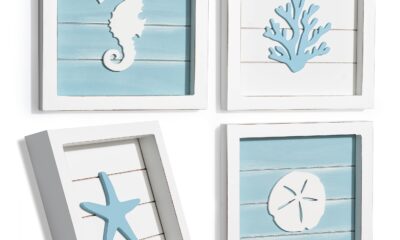


![Best Belt Driven Ceiling Fans for Efficient and Quiet Airflow [2024] 222 518CH7yaBsL](https://byretreat.com/wp-content/uploads/2023/11/518CH7yaBsL-80x80.jpg)

![Best Solar Power Christmas Lights for a Bright and Eco-Friendly Holiday Season [2024] 224 71js B7oxIL](https://byretreat.com/wp-content/uploads/2023/11/71js-B7oxIL-80x80.jpg)